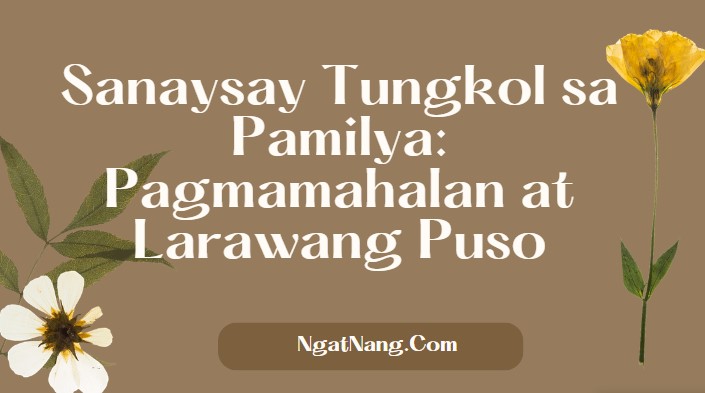Mga Sanaysay Tungkol sa Pamilya (5 Sanaysay)

Ang mga sanaysay tungkol sa pamilya na inyong mababasa ay mga halimbawa ng uri ng sanaysay na pormal at di-pormal. Ang mga ito ay kinalap at pinagsama-sama galing sa iba’t ibang website para mas mapadali ang iyong paghahanap at para bigyan ka ng ideya kung sakaling gagawa ka rin ng sanaysay sa kaparihong paksa. Sana ay makatulong sa inyo ang koleksyong ito at makuha n’yo ang mahahalagang aral na nakapaloob dito.
SEE ALSO: Mga Talumpati Tungkol sa Pamilya

Mga Halimbawa ng Sanaysay Tungkol sa Pamilya
Ang pamilya, masayang pamilya, ako ay ako dahil sa aking pamilya, kahalagahan ng pamilya, pagbubuo ng isang malakas na pamilya.
Ang sanaysay na ito ay galing sa seasite.niu.edu
Una sa lahat, ang isang Pilipino ay bahagi ng kanyang pamilya. Kahit siya ay doktor, manunulat, siyentipiko, o ano pa man, nananatili siyang ama o anak, pamangkin o apo, sa loob ng kanyang pamilya. Dito ay iba ang kanyang katungkulan at ang pagkakakilala sa kanya. Sa lahat ng oras ay pangunahin sa kanya ang kanyang tungkulin bilang kasapi ng isang pamilya.
Ang pinakaubod ng pamilyang Pilipino ay ang ama, ina at mga anak. Ang ama ang pinakapuno ng pamilya. Siya ang nasusunod at nagpapasya para sa pamilya. Sa kabilang dako ay tungkulin niyang pakainin, bigyan ng matitirhan at papag-aralin ang mga miyembro ng kanyang pamilya. Kaya siya ang nagtatrabaho at kumikita ng pera. Ang ina naman ang bahala sa bahay at sa pag-aalaga ng mga bata. Siya ang humahawak ng pera ng pamilya at pinagkakasya ito sa pangangailangan ng pamilya. Ang mga anak naman ay may responsibilidad rin. Sagutin nila ang mahusay na pag-aaral at ang pagtulong sa bahay.
Kasama rin sa pag-aalala ng pamilya ang lolo at lola, ang mga kapatid ng ama at ina, lalo na’t ang mga ito’y nakababata. Kadalasa’y sama-sama sa isang bahay ang lolo at lola, ang ama at ina, at ang mga anak. Kung minsa’y kapisan din ang wala pang asawang kapatid ng ama o ina. Kapag ganitong kumpleto ang pamilya’y tatlong salin-lahi ang nakatira sa iisang bahay. Tulung-tulong sila sa mga gawain at sa paghahanap-buhay.
Masinsin ding inaalala ng pamilya ang bawat kaarawan at anibersaryo. Sa mga okasyong ito ay may mga salu-salo’t pagtitipon. Ang may kaarawan o may anibersaryo ay binibigyan ng regalo. Nagbabalitaan ang pamilya at ikinukuwento ang buhay-buhay ng isa’t-isa. Gayun din ang buhay-buhay ng iba pang kamag-anak. Sa ganitong paraan, alam ng lahat ang halos lahat nang nangyayari sa iba pang pinsan o pamangkin. Masasabing tsismis ang ganitong pagbabalitaan subali’t may mabuti itong aspeto. Kung may nangangailangan ng tulong ay nalalaman kaagad ng pamilya.
Ang pagtulong ay isang malaking bahagi ng samahan ng magkakamag-anak. Sa pananaw na ito, hindi maaring umangat nang nag-iisa ang isang tao. Kailangan niya ang tulong ng kaniyang pamilya – sapagkat lubhang mahirap ang buhay sa mundo. Sa kabilang dako, ang taong may pag-aaruga sa kanyang pamilya ay kinakasiyahan ng kapalaran. Ganito halos ang nangyayari lalo na sa mga pamilya ng dukha. Nagtutulong-tulong ang mga nakababatang anak, ang ama at ina, upang mapaaral ang pinakamatanda. Pag nakatapos na ito, tungkulin naman niyang paaralin ang kanyang mga kapatid. Kung mag-aasawa man siya ay inaasahan na tutulong din ang mapapangasawa niya.
May mabuti at masamang aspeto ang ganitong tradisyon sa Pilipinas. Kung minsan ay nagsasamantala ang ibang kamag-anak. Sapagkat lagi silang may matatakbuhan ay hindi sila natututong maging responsable sa kanilang buhay. Pangalawa’y nahihirapan ang isang Pilipino na makaabot sa kanyang mga layunin sa buhay. Mangyari’y dala-dala niya ang problema ng kanyang buong pamilya.
Sa kabilang dako, ang pagtutulungang ito marahil ang pinakamatibay na sandata laban sa trahedya. Ang mga naulilang mga bata ay may maaasahan. At kahit na mahirap ang isang pamilya’y nakararaos din kahit paano. Ang pamilya rin ang nagtataguyod ng mahuhusay na pagpapahalagang sosyal. Itinataguyod nito ang pagiging responsable, ang pagtutulungan, ang pagkakaisa at pagtatangi sa isa’t-isa. Matibay din itong sanggalang laban sa tinatawag na “alienation” at iba pang karamdaman ng isip at damdamin.
Source: Ramos, T. V. and Goulet, Rosalina, M. (1981). Intermediate Tagalog: Developing Cultural Awareness through Language. University of Hawaii Press: Honolulu.
Akda ni gracemariedurac14 galing sa Wattpad
Sa ating mundo ipinanganak tayo na walang kamuwang-muwang ngunit may mga taong handa tayong mahalin, alagaan at ibigay ang lahat kung anong meron sila, handang magsakripisko upang tayo’y lumaki ng maayos at may takot sa dios. Ipinapakita nila kung gaano sila kasaya noong dumating tayo sa buhay nila at ipinapadama nila kung ano ang kahulugan ng pag-ibig at pamilya.
Ang aking pamilya ang aking inspirasyon .Sila ang nagbigay sakin ng pagmamahal. Masayang masaya ako dahil sila ang naging aking pamilya. Ang king tatay at ang aking nanay ang mga taong mahalaga sakin at ang aking mga kapatid ay ang mga taong nagpapasaya sakin . Sa ating pamilya nakakaranas tao ng mga pagsubok sa buhay ngunit pag tayo ay buo hindi tayo sumusuko dahil alam natin sa pamilya tayo humuhugot ng lakas ng loob upang malampasan ang sakit at pagsubok na ating nararamdaman
Ipinapakita sa aking pamilya kunG gaano kahalaga ang pagmamahalan sa bawat isa. Sa pamilya nagsisimula lahat ng mga gawaing mabuti at paggalang sa ibang tao. ibinibigay nila ang ating mga pangangailangan. Ang pagmamahalan ng pamilya ay isang mahalagang bagy kung saan ibinibigay natin sa bawat isa .Ang may matatag na pamilya ay isang pundasyon ng lahat ng dakilang bansa.
Akda ni Kimberly T. Balontong
Pamilya Pera? Salapi? Luho? Wala ako niyan. Pero nag-iisa lang ang itunuturing kong kayamanan, ang aking pamilya. Kaagapay, kasalo at kadamay sa lahat ng oras o bagay. Sa lahat ng nararanasan ko, ang aking pamilya ang siyang aking nagiging sandigan. Ako ay ako dahil sa aking pamilya.
Isa-isahin mo ang iyong mga karanasan sa pamilya na iyong nakapulutan ng aral o nagkaroon ng positibong impluwensya sa iyong sarili. Sa loob ng 13 taon na aking pananatili sa mundong ito, kahit kailan di ko naranasan ang magkaroon ng buong pamilya. Dahil wala akong tatay. Pero, kahit ganoon, pinaramdam sa akin ng aking nanay at dalawa kong kuya na hindi ako nag-iisa. At ang dalawa kong kuya ang siyang nagsilbi at nagparamdam sa akin na meron akong tatay kahit papaano. Ang aking aral na napulot ay, maging kontento kung ano ang meron ka. At imbes na maghanap ng kulang mo, ituon mo ang atensyon mo sa mga bagay na meron ka. Dahil hangga’t hinahanap mo ang kulang sa’yo, lalo kang magiging malungkot.
Suriin mo rin kung paano ka inihanda o inihahanda ng iyong pamilya sa mas malaking mundo ang pakikipagkapwa. Isa-isang itala sa iyong kuwaderno ang lahat ng mahahalagang reyalisasyon tungkol dito. Mula sa aking pagkabata, tinuruan na ako ng aking pamilya na maging magalang at mabait sa lahat ng tao. Tinuruan nila ako ng magandang asal. At kapag ako ay may pagkakamali, pinapaliwanag sa akin ng aking ina ang lahat upang aking maintindihan kung bakit niya ako dinidisiplina. Hindi sa paraang natatakot ako. Mula noon hanggang ngayon, tumatak na sa aking isip ang tamang pakikitungo sakapwa mo. At ang una kong naging paaralan ay ang aking pamilya.
Mas magiging makabuluhan kung lilikha ng isang “photo journal” sa computer gamit ang moviemaker o powerpoint. Maaari ring gumupit ng mga larawan mulasa lumang magasin at ito ang gamitin upang ipahayag ang bunga ng ginawang pagsusuri.
Ano ang iyong naging damdamin sa pagsasagawa ng gawaing ito? Ako, ay masaya sapagkat inilalarawan ko ang aking mga karanasan at bumabalik-balik sa isip ko ang mga pangyayaring nagpatibay pa sa aming relasyon bilang pamilya. Ano ang mahalagang reyalisasyon na iyong nakuha mula sa gawaing ito? Marami akong napagtanto habang ginagawa ito. Natutunan ko na i-share sa iba ang karanasan ko sa pamilya ko at matutong makuntento sa kung ano ang meron ka.
Bakit mahalagang maglaan ng panahon upang suriin ang iyong ugnayan sa iyong pamilya? Ipaliwanag. Sa paglipas ng panahon, alam nating mas bumibigat at dumadami ang ating responsible bilang isang miyembro sa pamilya. Minsan sa sobra nating busy, hindi na nagkakaroon ng komunikasyon, na madalas pang nagdudulot sa pagkasira ng isang pamilya. Para sa akin, kahit papaano nabibigyan naman namin ng sapat na oras ang bawat isa. Ang sabay na pagsisimba, ay magpapatibay hindi lamang sa samahan, kundi sa pananampalataya sa Diyos.
Ano ang ibinibigay ng pamilya na tunay na nakatutulong sa isang indibidwal upang mapaunlad ang kanyang sarili tungo sa pakikipagkapwa? Binibigyan nila ng oras ang pagdidisiplina at higit sa lahat hindi nila ito idinadaan sa pananakot at pananakit. Pero kung minsan, hindi rin mapigilan ang damdamin kaya minsan napapalo. Pero ipinapaliwanag naman nila sa akin ng maayos. Dahil dito, natuto akong rumespeto gaya nga ng turo sa akin ng aking pamilya. Ang pagiging masiyahin ay natutuhan ko din sa kanila. Ang una kong guro ay ang aking pamilya.
Akda ni April Juanitez
Ang kahalagan ng pamilya ay mahalaga sapagkat dito nag uumpisa at dito hinuhubog ang isang pagkatao ng bawat isa. Ito ang sandigan ng bawat isa sa tuwing may problema at dito rin humuhugot ng lakas ng loob ang bawat isa kapag may dumadating na problema.
Ang ibang kabataan ay napapariwara ang buhay sa kadahilanang ang pundasyon ng kanilang pamilya ay mahina at walang pag kakaisa. Ang mga kabataan na galing sa broken family ay nasisisira ang kanilang buhay sapagkat nagrerebelde sila at natututo rin silang gumamit ng mga ipinagbabawal na gamot. Pero hindi lahat ng mga kabataan na galingbsa broken family ay napapariwara ang buhay, ang iba ay ginagamit itong inspirasyon sa buhay para maging matagumpay sila sa kanilang mga pangarap.
Mahalaga ang pamilya dahil sila ang mas higit na nakakaintindi sa atin sa mga panahong wala tayong masasandalan sa panahon ng puro problema lang ang dumarating sa buhay. Ang kahalagahan ng buong pamilya na ito ay kayang mong humarap sa mundo na buo ang iyong pagkatao dahil sa pamilya at masaya ang may buong pamilya.
Ang sanayasay na ito ay galing sa hawaii.edu
Ano ang kahulugan ng pamilya para sa inyo? May ilang taong naniniwalang ang isang pamilya’y tulad ng isang magandang kahong puno ng mga bagay na gusto nila: pagmamahal, katuwaan, pagkakaroon ng kasama (companionship) at iba pang magagandang bagay; isang kahong mabubuksan kailanma’t nais nila ng mga bagay na ito.
Marahil, mas nakakatulad ng isang walang lamang kahon ang pamilya. Nagiging maganda at makabuluhanito batay sa kung ano ang ginagawa rito ng mga tao. Kailangang sidlan muna ito ng laman ng mga tao bago may makuhang anuman mula rito. Kung nais natin ng pagmamahal at katuwaan sa ating mga pamilya, kailangang magtanim muna tayo ng pagmamahal, paglilingkod at paghikayat sa isa’t isa. Ang mga ito ang nagpapatigib sa kahon. Ang paglalabas ng higit sa isinilid natin ay magpapabasyo sa kahon sa malao’t madali.
Matatagpuan sa buong mundo ang maraming matatag na pamilya. Maaaring mayaman o mahirap sila. Maaaring iba-iba rin ang pagkakabuo nila, halimbawa:
- isang ina, ama, at mga anak, o
- isang ina na may isa o higit pang anak, o
- mga lolo’t lolang kasama ng kanilang mga anak at apo, o
- mag-asawang walang anak.
Matatatag na pamilya ang pundasyon ng lahat ng dakilang bansa. Tumutulong silang humubog ng mga taong nagiging katulad natin. Kung kailangan nating lumaking malulusogat maliligaya ang mga anak natin, mahalagang magkaroon tayo ng matatatag na pamilya.
Anim ang Katangiang Kailangan sa Pagbubuo ng Matatag na Pamilya
Para mapuno ang “kahon”, kailangang magkaroon ng sumusunod na katangian ang isang pamilya:
- may pananagutan (komitment) sila sa isa’t isa;
- nagpapakita ng pagpapahalaga;
- may mabuting komunikasyon;
- may panahong nagkakasama-sama sila;
- sumusunod sa kanilang mga paniniwalang ispiritwal at umaayon sa kanilang mga pagpapahalaga;
- nakakaagapay sa stress .
Pananagutan/Komitment
Makatutulong tayong lalong mapatatag ang pamilya sa pagkakaroon ng pananagutansa isa’t isa, sa pagiging tapat, sa pagsasama-sama bilang isang pangkat, at sa pag-aalaga sa isa’t isa. Maraming paraan para maipakita ang pananagutan at mapanatiling ligtas, malusog at maligaya ang pamilya. Narito ang ilan:
- Maging tapat sa inyong pamilya. Bawasan ang mga aktibidad sa labas at gumugol ng mas maraming oras sa piling nila.
- Tuparin ang mga pangako sa ibang miyembro ng pamilya.
- Sa puntong sekswal, maging tapat sa kapareha.
- Maging maaasahan. Tumawag sa bahay kung mahuhuli ka ng uwi.
- Tumawag at magsabing “mahal kita” kung naglakbay ka sa malayo.
- Bumuo ng mga alaalang pampamilya. Magtago ng family album na may mga retrato at kuwento.
- Kapag may problema, tumawag kaninuman, sa isang kamag-anak, kaibigan o isang tagapangalaga ng kalusugan*, para matulungan kayong harapin ito.
- Ano pa ang ibang paraan para maipakita ninyo ang pananagutan?
Pagpapahalaga
Kapag ipinakikita natin ang pagpapahalaga sa pamamagitan ng mga salita at gawa, naipakikita natin sa ating pamilyang pinahahalagahan at itinatangi natin sila. Maiging isipin kung gaano natin pinahahalagahan ang iba. Ngunit, hindi nila malalaman ang nararamdaman natin hangga’t hindi natin sinasabi. Maraming pamilya ang may espesyal na pagtitipon kung Araw ng mga Ina o Araw ng mga Ama upang maipadama ang pagpapahalaga sa magulang. Maraming kultura ang nagdiriwang ng mga tanging araw para parangalan ang mga bata. Narito ang ilang ideya tungkol sa ibang paraan ng pagpapakita ng pagpapahalaga:
- Sabihin sa isang miyembro ng pamilya na siya ’y mahal ninyo.
- Magsabi ng anumang positibo sa bawat miyembro ng pamilya araw-araw.
- Sorpresahin ang isang miyembro ng pamilya (halimbawa, isang ginawang kard) kahit na walang okasyon.
- Dalasan ang pagyakap sa mga miyembro ng pamilya.
- Hanapin ang mabuti sa bawat miyembro ng pamilya. Sabihin ito sa kanila.
- Tulungan ang isang miyembro ng pamilya sa kanyang gawain ( pagliligpit, paglalaba, paghuhugas ng pinggan, atbp.)
- Maglista ng 5 bagay na gusto ninyo sa isang miyembro ng pamilya. Ibigay ang listahan sa miyembrong iyon bilang isang regalo.
Dumaraan sa panahong nagkakaproblema ang pamilya. Magagamit nila ang problema para maging lalong matatag at malapit sa isa’t isa. Kung medyo babaguhin natin ang ating pag-iisip, makikita nating ang krisis ay isang oportunidad para maging matatag. Narito ang ilang bagay na maaaring subuking kung dumating ang problema.
- Mag-isip ng anumang mabuti, gaano man kasama ang sitwasyon.
- Humingi ng tulong sa sinumang dumaan na sa katulad na krisis (kamag-anak, kaibigan, kapitbahay), o humingi ng payo sa mga espesyalistang gaya ng sikolohista, abogado, o tagapangalaga ng kalusugan. Tumawag sa isang crisis hotline o minister. Makatutulong silang humanang ng tutulong sa inyo.
- Matutong magsama-sama bilang isang pamilya. Sa pamamagitan ng pagsasama-sama. Maliligtasan ng pamilya ang kahit pinakamahirap na problema.
- Tandaang ang anumang pagbabago sa buhay — pagsilang ng isang anak, bagong trabaho o pagkataas sa tungkulin, kasal, kamatayan o pagreretiro–ay laging stressful .
- Tandaang ang mga stress, problema at paghihirap ay bahagi ng buhay.
- Harapin ang mga problema nang dahan-dahan. Gumawa ng listahan ng mga bagay na dapat gawin at isa-isang asikasuhin ito.
- Huwag alalahanin ang mga nakalipas o ang mga bagay na wala kayong kapangyarihang kontrolin.
- Manood ng isang nakakatawang sine, tumawag sa isang kaibigan, makipagkuwentuhan nang masasayang kuwento, piliting tumawa at/o umiyak.
- Mag-ehersisyo para mawala ang tensiyon at matulungan kayong magrelaks. Gawin ito nang magkakasama bilang isang pamilya.
Komunikasyon
Gaano man kahirap, importante sa isang pamilyang magkaroon ng komunikasyon. Kailangan nating kausapin, pakinggan, at unawain ang isa’t isa. Kailangang may makahati tayo sa ating mga kaisipan at damdamin. Sa ganitong paraan tayo natututong magtiwala at umasa sa isa’t isa.
Araw-araw, nagbibigay ng pagkakataon ang buhay para gawin ito. Narito ang isang halimbawa:
- Magbigay ng pagkakataon para mag-usap — sa paglalakad, pagkain, o habang naghuhugas ng pinggan. Pag-usapan ang mga pang-araw-araw, gayundin ang mahahalagang bagay.
- Sabihin ang masasakit at nakahihiyang karanasan, gayundin ang mabubuti.
- Maging isang mabuting tagapakinig — sa katandaan man o kabataan.
- Kung mainisin o masyadong tahimik ang isang miyembro ng pamilya, tanungin kung ano ang problema, ngunit maging sensitibo rin kung nangangailangan ito ng pribasya.
- Maging bukas-loob na magsabi kung ano ang nakaaabala sa inyong isip o kung ano ang ikinagagalit ninyo; huwag hayaang lumala ito.
- Maging ispesipiko. Sabihing isa-isa ang problema. Igalang ang ideya ng bawat isa kahit hindi ninyo ito sinasang-ayunan.
- Alisin ang karahasan sa pamilya. Magtalo nang walang paluan. Disiplinang walang sampalan.
Dahil masyadong marami tayong pinagkakaabalahan sa buhay, wala tayong panahong makita o makasama ang isa’t isa. Mahalagang maglaan ng panahon para magkasama-sama upang makita ang isa’t isa at maging matibay ang bigkis ng pamilya. Maraming paraan para magkasama-sama. Nakalista sa ibaba ang ilan:
- Basahan ng libro o makipagkuwentuhang kasama ang mga bata bago matulog.
- Patayin ang TV at maglarong magkakasama.
- Gugulin ang mga holiday at espesyal na okasyon sa piling ng buong pamilya. Magplano ng mga lingguhang gawaing kalulugdan ng buong pamilya.
- Paminsan-minsan, isama sa trabaho ang inyong mga anak para makita nila kung ano ang ginagawa ninyo.
- Magtrabaho bilang isang pamilya sa isang proyektong pang-eskwela o pangkomunidad, gaya ng pamumulot ng basura.
- Kahit isang beses isang araw, kumaing magkakasalo bilang isang pamilya.
- Dumalo sa miting ng mga magulang, sa isang pangyayaring pang-isport o pang-eskuwela, at sa mga seremonyang kumikilala ng tagumpay ng isang miyembro ng pamilya.
- Gawing “malaki” o “importante” ang kaarawan ng bawat isa.
- Makipag-ayos sa isang mag-aalaga ng bata para makapag-date kayo ng inyong kabiyaknang kayo lamang dalawa.
Pagpapahalaga at Paniniwala
Nagsisimba man sila o hindi, may pinananaligang dakilang kabutihan o kapangyarihan sa kanilang buhay ang matatatag na pamilya. Ang pananalig na iyon ang nabibigay sa kanila ng lakas at layunin. Iniimpluwensiyahan nito ang kanilang pang-araw-araw na kaisipan at kilos. Ang sumusunod ang ilan sa mga paraan kung paano maipapatupad ng pamilya ang kanilang paniniwala:
- Tratuhin ang pamilya kung paano mo tatratuhin ang sarili.
- Imbitahan ang isang kaibigang makipaghapunan sa inyong pamilya.
- Ipagdiwang ang religious holidays sa piling ng pamilya.
- Makipagpangkat sa inyong pamilya sa pangangalaga ng kalikasan: bawasan ang mga ginagamit; muli’t muling gamitin ang ilang bagay, mag-recycle ng papel, bote, plastik at iba pang karaniwang itinatapon.
- Gumamit ng kuwento sa pagtuturo sa mga anak ng pagpapahalagang gaya ng katapatan, paumanhin at pananagutan.
- Magboluntir ng oras o pera sa isang kapaki-pakinabang na layuning pinaniniwalaan ninyo.
- Magkakasamang magsimba o magpasalamat, sa anumang paraan ng pagsampalatayangginagawa ng inyong pamilya.
- Maging modelo ng inyong pamilya sa pagsasabuhay ng inyong mga paniniwala.
Source: Family Resource Kit ng UH-Manoa Center on the Family. Salin ni Ruth Elynia S. Mabanglo.
SEE ALSO: Mga Sanaysay Tungkol sa Kahirapan
Ano sa ang masasabi mo sa mga sanaysay tungkol sa pamilya na iyong nabasa at anu-ano ang mga aral na natutunan mo? Mag-iwan lang ng komento sa ibaba.
You May Also Like
- Ibong Adarna Buod ng Bawat Kabanata 1-46 (with Talasalitaan)
- Tagalog Knock Knock Jokes: 50+ Best Pinoy Knock Knock Jokes
- Alamat ng Bayabas
- Mga Sanaysay Tungkol sa Kalikasan (15 Sanaysay)
- Tula Tungkol sa Kalikasan (13 Tula)
- X (Twitter)
- More Networks
Halina't Pagaralan Natin Ang Filipino

Sanaysay Tungkol sa Pamilya (10 Sanaysay)
Ang mga sanaysay na ito ay isang pagninilay sa iba’t ibang aspeto ng pamilya sa konteksto ng lipunang Pilipino. Tinalakay dito ang mahalagang papel ng pamilya sa pagpapalaki ng mga anak, pagpapanatili ng ugnayan at pagkakaisa, at ang pagharap sa mga hamon at pagbabago ng modernong panahon. Sa pamamagitan ng mga sanaysay na ito, inilalahad ang kahalagahan ng pamilya bilang pundasyon ng lipunan, pati na rin ang mga hamon at oportunidad na kaakibat ng pagiging bahagi ng isang pamilyang Pilipino.
Halimbawa ng mga Sanaysay Tungkol sa Pamilya
Ang koleksyon ng mga sanaysay tungkol sa pamilya na ito ay naglalayong ipakita ang iba’t ibang dimensyon ng pamilyang Pilipino. Mula sa kahalagahan ng tradisyon, ang papel ng pamilya sa pag-unlad ng kabataan, hanggang sa mga hamon na dala ng makabagong panahon, ang mga sanaysay na ito ay sumasalamin sa mga karanasan, pagsubok, at tagumpay na bahagi ng buhay pamilya. Ang bawat sanaysay ay nagbibigay ng mas malalim na pang-unawa sa kahalagahan ng pamilya sa ating lipunan at sa paghubog ng ating mga personal na pagkatao at halaga.
Kahalagahan ng Pamilya
Sa lipunan, ang pamilya ang pinakapundasyon ng paghubog ng karakter at pagkatao ng isang indibidwal. Ito ang unang paaralan kung saan natututunan ang mga pangunahing aral sa buhay tulad ng pagmamahal, respeto, at pagtutulungan. Sa loob ng pamilya, natututunan ng bawat isa ang kahalagahan ng ugnayan at pakikipagkapwa.
Ang pamilya rin ang nagbibigay ng suporta at gabay sa mga oras ng kahirapan at kaligayahan. Ito ang nagtuturo ng pagiging matatag sa harap ng mga hamon at nagbibigay ng inspirasyon upang magpatuloy sa buhay. Sa pamamagitan ng pamilya, natutunan ng mga anak ang tamang pagharap sa mga problema at paggawa ng mga desisyon.
Sa kasalukuyang panahon, maraming pagbabago ang naganap sa estruktura ng pamilya. Gayunpaman, nananatili ang esensya nito sa paghubog ng malusog at balanseng lipunan. Ang pamilya ang nagsisilbing haligi sa pagpapalakas ng moral at etikal na aspeto ng isang komunidad.
Sa pamilya rin nabubuo ang unang ugnayan at koneksyon ng isang indibidwal sa lipunan. Dito natututunan ang mga unang hakbang sa pakikipag-ugnayan sa ibang tao. Ang mga aral at karanasan na natutunan sa loob ng pamilya ay dala-dala ng isang tao sa kanyang paglaki at pagharap sa mas malaking lipunan.
Higit sa lahat, ang pamilya ang nagbibigay ng walang kondisyong pagmamahal at tanggapin. Sa pamilya, natututunan ang tunay na kahulugan ng pagmamahal at pag-aalaga hindi lamang para sa sarili kundi pati na rin para sa iba.
Pamilya Bilang Gabay sa Buhay
Ang pamilya ang pangunahing gabay sa buhay ng bawat tao. Mula sa pagkabata, ang mga magulang at iba pang miyembro ng pamilya ang nagtuturo ng mga mahahalagang aral sa buhay. Sila ang nagbibigay ng direksyon at payo sa mga mahahalagang desisyon at pagsubok na kinakaharap.
Sa bawat yugto ng buhay, mahalaga ang papel na ginagampanan ng pamilya. Sa pagkabata, ito ang nagtuturo ng mga basic skills at moralidad. Sa kabataan, ang pamilya ang nagsisilbing suporta sa pagtuklas ng sarili at pagharap sa mga pagbabago. Sa pagtanda, ang pamilya ang nagbibigay ng lakas at inspirasyon upang magpatuloy.
Ang pamilya rin ang nagtuturo ng kahalagahan ng responsibilidad . Sa loob ng tahanan, natututunan ang pagiging responsable sa mga gawain at sa mga nakababatang kapatid. Ang mga aral na ito ay mahalaga sa paghubog ng isang responsable at produktibong mamamayan.
Sa pamilya rin natututunan ang kahalagahan ng pagtutulungan at pagkakaisa. Sa mga oras ng krisis at problema, ang pamilya ang unang nagtutulungan at nagdadamayan. Ang pagkakaroon ng matibay na suporta mula sa pamilya ay mahalaga sa pagharap sa mga hamon sa buhay.
Higit sa lahat, ang pamilya ang nagbibigay ng inspirasyon at lakas upang abutin ang mga pangarap. Ang suporta at pagmamahal na nanggagaling sa pamilya ay mahalaga sa pagbuo ng tiwala sa sarili at pagkakaroon ng positibong pananaw sa buhay.
Pamilya sa Makabagong Panahon
Sa paglipas ng panahon, maraming pagbabago ang naganap sa konsepto at estruktura ng pamilya. Sa makabagong panahon, mas naging kompleks at magkakaiba ang porma ng pamilya. Subalit, nananatili ang kahalagahan nito sa lipunan.
Ang modernong pamilya ay maaaring binubuo ng iba’t ibang porma, tulad ng single-parent families, blended families, at extended families. Ang bawat isa ay may kanya-kanyang hamon at dinamika, ngunit ang pangunahing layunin ay ang magbigay ng suporta at pagmamahal sa bawat miyembro.
Sa kabila ng mga pagbabago, nananatili ang pangangailangan ng bawat indibidwal sa pagkakaroon ng matatag at mapagmahal na pamilya. Ito ang nagbibigay ng seguridad at kumpiyansa sa isang tao upang harapin ang mundo. Ang pagkakaroon ng malusog na relasyon sa loob ng pamilya ay mahalaga sa mental at emosyonal na kalusugan ng bawat miyembro.
Ang modernong teknolohiya ay nagdala rin ng mga bagong hamon at oportunidad sa pamilya. Ang paggamit ng social media at iba pang digital platforms ay nagbukas ng bagong paraan ng komunikasyon at interaksiyon sa loob ng pamilya. Gayunpaman, mahalaga pa rin ang pagkakaroon ng quality time at personal na ugnayan sa bawat miyembro.
Sa huli, ang pamilya sa makabagong panahon ay patuloy na nagiging mahalagang aspeto sa buhay ng bawat tao. Sa kabila ng mga pagbabago at hamon, ang pamilya ay nananatiling sentro ng ating buhay at mahalagang salik sa ating personal at sosyal na pag-unlad.
Pagpapalaki sa mga Anak
Ang proseso ng pagpapalaki sa mga anak ay isa sa pinakamahalaga at pinakakomplikadong aspeto ng pagiging magulang. Ang layunin ng bawat magulang ay hindi lamang siguraduhin ang pisikal na kalusugan ng kanilang mga anak kundi pati na rin ang kanilang emosyonal at mental na pag-unlad. Sa pagpapalaki, mahalaga ang balanse sa pagitan ng pagbibigay disiplina at pagmamahal.
Ang komunikasyon ay susi sa pagbuo ng malakas na relasyon sa pagitan ng magulang at anak. Ang pagiging bukas at tapat sa pakikipag-usap ay nagpapalakas ng tiwala at nagbibigay ng pagkakataon para sa anak na maipahayag ang kanyang sarili. Importante rin na maging magandang halimbawa ang mga magulang sa kanilang mga anak, dahil sila ang unang modelo ng kanilang mga anak sa pag-uugali at asal.
Sa modernong panahon, maraming mga bagong hamon sa pagpapalaki ng mga anak, tulad ng impluwensya ng social media at teknolohiya. Mahalaga na magabayan ng mga magulang ang kanilang mga anak sa tamang paggamit ng mga ito. Dapat ding bigyang pansin ang emosyonal na pangangailangan ng mga anak, lalo na sa panahon ng kanilang pagdadalaga at pagbibinata.
Ang edukasyon ay isa rin sa mga pangunahing aspeto ng pagpapalaki. Hindi lamang ito tungkol sa akademikong kaalaman kundi pati na rin sa pagtuturo ng mga mahahalagang aral sa buhay. Ang pamilya ang unang lugar kung saan natututo ang isang bata ng mga halaga tulad ng pagmamahal, pagtutulungan, at integridad.
Higit sa lahat, mahalaga na palakihin ang mga anak na may pakiramdam ng seguridad at pagmamahal. Ang pagbibigay ng isang mapagmahal at suportadong kapaligiran ay mahalaga para sa kanilang malusog na paglaki at pag-unlad.
Ugnayan sa Loob ng Pamilya
Ang ugnayan sa loob ng pamilya ay isang mahalagang aspeto na nagbibigay ng direksyon at kahulugan sa buhay ng bawat miyembro. Ang malusog na relasyon sa pamilya ay nagbibigay ng suporta, pagmamahal, at seguridad na kailangan ng bawat isa para sa personal at sosyal na pag-unlad.
Ang komunikasyon ay pangunahing salik sa pagpapatibay ng ugnayan sa pamilya. Ang regular na pag-uusap at pagbabahagi ng mga karanasan at damdamin ay nagpapalalim ng koneksyon sa isa’t isa. Ang paggugol ng oras na magkasama, tulad ng sa pagkain ng hapunan o paggawa ng mga family activities, ay mahalaga rin sa pagpapalakas ng ugnayan.
Ang pagrespeto sa isa’t isa, anuman ang edad o posisyon sa pamilya, ay mahalaga rin. Ito ay nagpapakita ng pagpapahalaga sa indibidwalidad ng bawat miyembro at nagbibigay daan para sa isang malusog at masayang kapaligiran sa loob ng tahanan.
Ang pagtutulungan at pagdadamayan sa oras ng pangangailangan ay isa sa mga pinakamahalagang katangian ng isang pamilya. Ang pagsasama-sama sa panahon ng krisis at problema ay nagpapatibay sa bond ng pamilya at nagtuturo ng kahalagahan ng pagkakaisa at lakas bilang isang grupo.
Sa huli, ang malusog na ugnayan sa loob ng pamilya ay mahalaga hindi lamang para sa emosyonal na kalusugan ng bawat miyembro kundi pati na rin para sa pagbuo ng isang malakas at matatag na lipunan.
Pagkakaisa ng Pamilya sa Modernong Panahon
Sa paglipas ng panahon at sa pagbabago ng lipunan, nananatili ang kahalagahan ng pagkakaisa sa loob ng pamilya. Sa modernong panahon, kung saan maraming mga bagong hamon at distraksyon, lalo pang naging mahalaga ang pagkakaroon ng matibay na pamilya.
Ang teknolohiya, habang nag-aalok ng maraming benepisyo, ay maaari ring maging sanhi ng pagkakalayo-loob ng mga miyembro ng pamilya. Mahalaga na magkaroon ng balanse sa paggamit ng mga gadgets at internet. Ang paggugol ng oras na magkasama nang walang distractions mula sa teknolohiya ay mahalaga sa pagpapanatili ng malapit na ugnayan.
Ang pagiging abala sa trabaho at iba pang responsibilidad ay isa ring hamon sa pagpapanatili ng pagkakaisa ng pamilya. Mahalaga na maglaan ng oras para sa pamilya sa kabila ng abalang iskedyul. Ang pagkakaroon ng regular na family time, tulad ng weekend outings o family dinners, ay mahalaga para mapanatili ang koneksyon sa isa’t isa.
Ang pagtanggap at pag-unawa sa mga pagbabago sa pamilya, tulad ng pagkakaroon ng bagong miyembro o pagbabago sa estruktura ng pamilya, ay mahalaga rin. Ang adaptability at open-mindedness ay susi sa pagpapanatili ng pagkakaisa at pag-unawaan sa pamilya.
Sa huli, ang pagkakaisa ng pamilya sa modernong panahon ay nangangailangan ng conscious effort at dedikasyon mula sa bawat miyembro. Ang pagpapahalaga sa pamilya at paglalaan ng oras at effort para sa pagpapalakas ng ugnayan ay mahalaga para sa isang masaya at matatag na pamilyang nakaharap sa mga hamon ng modernong panahon.
Pagpapanatili ng Tradisyon sa Pamilya
Ang tradisyon ay isang mahalagang bahagi ng bawat pamilya. Ito ang nag-uugnay sa kasalukuyan sa nakaraan at nagbibigay ng isang natatanging pagkakakilanlan sa bawat pamilya. Ang mga tradisyon, maging ito man ay mga espesyal na selebrasyon, ritwal, o simpleng gawain, ay nagbibigay ng kahulugan at nagpapatibay ng bond ng mga miyembro ng pamilya.
Ang pagpapanatili ng mga tradisyon ay nagbibigay ng pakiramdam ng pagiging konektado at kabilang sa isang grupo. Para sa mga bata, ito ay nagbibigay ng isang pakiramdam ng seguridad at pagiging bahagi ng isang mas malaking kuwento. Ang mga tradisyon ay nagtuturo rin ng mga halaga at aral na mahalaga sa paghubog ng kanilang pagkatao.
Sa modernong panahon, maraming hamon sa pagpapanatili ng mga tradisyon sa pamilya. Ang pagbabago sa lifestyle at abala sa trabaho ay ilan lamang sa mga ito. Gayunpaman, mahalaga ang conscious effort na maglaan ng oras at panatilihin ang mga ito upang mapanatili ang kultura at kasaysayan ng pamilya.
Ang paglikha ng mga bagong tradisyon ay isa ring mahalagang aspeto. Habang mahalaga na panatilihin ang mga lumang tradisyon, ang pag-adapt at paglikha ng mga bagong tradisyon na akma sa kasalukuyang konteksto ng pamilya ay mahalaga rin. Ito ay nagpapakita ng paglago at adaptability ng pamilya.
Sa huli, ang mga tradisyon sa pamilya ay mahalaga sa pagpapanatili ng pagkakaisa at pagbibigay ng pakiramdam ng pagpapahalaga at belongingness sa bawat miyembro. Ito ay nagbibigay ng isang mas malalim na kahulugan sa mga espesyal na sandali at nagpapalakas ng ugnayan ng bawat isa sa loob ng pamilya.
Ang Halaga ng Pamilya sa Pag-unlad ng Kabataan
Ang pamilya ay may napakahalagang papel sa pag-unlad ng kabataan. Ito ang unang lugar kung saan natututunan ng mga bata ang mga mahahalagang aral sa buhay. Ang pagkakaroon ng isang supportive at loving na kapaligiran sa pamilya ay mahalaga para sa malusog na paglaki at pag-unlad ng mga kabataan.
Ang mga magulang at iba pang miyembro ng pamilya ay nagsisilbing mga role model sa mga kabataan. Ang kanilang mga asal, saloobin, at desisyon ay may malaking impluwensya sa paghubog ng pagkatao at values ng mga bata. Ang positibong pakikipag-ugnayan at suporta mula sa pamilya ay nagpapalakas ng tiwala sa sarili at self-esteem ng mga kabataan.
Ang edukasyon, hindi lamang sa akademiko kundi pati na rin sa buhay, ay nagsisimula sa loob ng pamilya. Ang pamilya ang nagtuturo sa mga kabataan ng kahalagahan ng sipag, tiyaga, at pagtitiwala sa sarili. Gayundin, ang pamilya ang unang nagtuturo sa kanila ng pagiging responsable at etikal.
Ang emosyonal na suporta na nanggagaling sa pamilya ay mahalaga rin, lalo na sa panahon ng kabataan kung saan maraming pagbabago at hamon ang kinakaharap. Ang pagkakaroon ng isang secure at supportive na pamilya ay nakakatulong sa mga kabataan na harapin ang mga ito nang may lakas at kumpiyansa.
Sa huli, ang pamilya ay may mahalagang papel sa paghubog ng susunod na henerasyon. Ang malusog at positibong kapaligiran sa pamilya ay susi sa paghubog ng masaya, matatag, at responsable na mga kabataan.
Mga Hamon at Pagbabago sa Pamilyang Pilipino
Ang pamilyang Pilipino, tulad ng maraming pamilya sa buong mundo, ay nahaharap sa iba’t ibang hamon at pagbabago sa paglipas ng panahon. Ang mga pagbabagong ito ay may malaking epekto sa dinamika at relasyon sa loob ng pamilya.
Isa sa mga pangunahing hamon ay ang paglaki ng bilang ng mga OFW (Overseas Filipino Workers). Ang pag-alis ng isa o parehong magulang para magtrabaho sa ibang bansa ay may malaking epekto sa estruktura at ugnayan ng pamilya. Bagama’t nagdudulot ito ng financial stability, nagdudulot din ito ng emotional strain sa mga miyembro ng pamilya.
Ang modernisasyon at globalisasyon ay nagdala rin ng pagbabago sa mga tradisyonal na pananaw at gawi. Ang impluwensya ng Western culture sa pamamagitan ng media at teknolohiya ay nagdulot ng mga bagong hamon sa pagpapanatili ng mga tradisyonal na halaga at pagkakakilanlan ng pamilyang Pilipino.
Ang pagbabago sa societal norms, tulad ng pagtanggap sa mga single-parent families at same-sex couples, ay nagdudulot rin ng pagbabago sa konsepto ng pamilya. Ang mga ito ay nangangailangan ng adaptasyon at pag-unawa mula sa tradisyonal na pananaw ng pamilyang Pilipino.
Sa kabila ng mga hamon at pagbabago, nananatiling mahalaga ang pamilya sa kultura at lipunang Pilipino. Ang pagkakaroon ng malakas na ugnayan, suporta, at pagmamahal sa pamilya ay patuloy na nagbibigay ng lakas at inspirasyon sa bawat Pilipino sa pagharap sa mga hamon ng buhay.
Sa huli, ang pamilyang Pilipino ay patuloy na nag-a-adapt at nagbabago, habang pinapanatili ang kanyang mga core values at traditions. Ang mga hamon at pagbabago ay hindi lamang nagdudulot ng mga problema kundi nagbibigay rin ng oportunidad para sa paglago at pag-unlad ng bawat pamilya.
Pagbabago at Pag-aangkop ng Pamilyang Pilipino sa Makabagong Panahon
Ang pamilyang Pilipino ay kilala sa pagiging matibay at malapit sa isa’t isa. Subalit, sa paglipas ng panahon at sa mabilis na pagbabago ng lipunan, ang tradisyonal na istruktura at dinamika ng pamilyang Pilipino ay sumasailalim sa maraming pagbabago at pagsubok.
Isa sa mga pinakamalaking pagbabago na kinakaharap ng pamilyang Pilipino ay ang impluwensya ng globalisasyon at modernisasyon. Ang pag-usbong ng teknolohiya, lalo na ang internet at social media, ay nagdala ng bagong paraan ng komunikasyon at interaksiyon. Bagama’t ito ay nagbibigay ng maraming benepisyo, tulad ng mas madaling komunikasyon sa mga mahal sa buhay na nasa malayo, ito rin ay nagdudulot ng mga hamon sa pagpapanatili ng malapit na ugnayan sa loob ng pamilya.
Ang pagdami ng mga Overseas Filipino Workers (OFW) ay isa pang mahalagang isyu na nakakaapekto sa pamilyang Pilipino. Ang pagkakaroon ng isa o higit pang miyembro ng pamilya na nagtatrabaho sa ibang bansa ay nagdudulot ng emosyonal at sosyal na hamon, lalo na sa aspeto ng pagpapalaki sa mga anak at sa pagpapanatili ng magandang relasyon sa pamilya.
Sa kabila ng mga hamong ito, patuloy na nagpapakita ng katatagan at kakayahang mag-adapt ang pamilyang Pilipino. Maraming pamilya ang natututong gamitin ang teknolohiya para manatiling konektado, at ang mga OFW ay nagiging inspirasyon para sa kanilang mga anak dahil sa kanilang sakripisyo at pagpupursigi.
Ang pagpapanatili ng mga tradisyon, tulad ng mga pagtitipon sa mahahalagang okasyon at ang pagpapahalaga sa mga nakatatandang miyembro ng pamilya, ay nananatiling isang mahalagang bahagi ng kulturang Pilipino. Ang mga ito ay nagbibigay ng lakas at inspirasyon sa pamilya upang magpatuloy sa pagharap sa mga hamon ng makabagong panahon.
Sa huli, ang pamilyang Pilipino ay patuloy na nagbabago at umuunlad habang pinananatili ang kanilang mga core values at tradisyon. Ang kanilang kakayahang mag-adapt at magkaisa sa kabila ng mga pagsubok ay patunay ng kanilang lakas at pagiging buo bilang isang pamilya sa makabagong panahon.
Leave a Comment Cancel reply
Save my name, email, and website in this browser for the next time I comment.

Sanaysay Tungkol sa Aking Pamilya
Ang pamilya ang batayan ng lipunan, na may higit sa 70% ng mga tao sa buong mundo na nagtuturing sa pamilya bilang pinakamahalagang aspeto ng kanilang buhay.
Noong lumalaki ako, laging natutuwa ako sa mga kumplikadong ugnayan ng relasyon na bumubuo ng aking pamilya. Mula sa di-pinasasalitang pagkakaisa ng mga kapatid hanggang sa karunungan na ipinamana mula sa isang henerasyon patungo sa susunod, bawat pamilya ay may taglay na kakaibang kuwento na naghihintay na alamin.
Ang mga kumplikasyon at detalye ng mga koneksyon sa pamilya ay laging nakaaakit sa akin.
Table of Contents
Mga mahahalagang aral
- Ang mga tradisyon at ang ari-arian ng pamilya ay nagpapalakas ng ating koneksyon sa nakaraan at nagbibigay inspirasyon sa ating kinabukasan.
- Ang pagkakaisa at suporta ng pamilya ay lumilikha ng matibay na sistema ng pakikisama sa harap ng mga hamon.
- Ang pagmamahal ng isang ina ay bumubuo ng mga halaga at nagbibigay ng walang-humpay na habag at gabay sa kanyang mga anak.
- Ang mga relasyon ng magkapatid ay nag-aalok ng emosyonal na suporta, pang-unawa, at kasamahan sa mga hamon ng buhay.
Pamana at mga Tradisyon ng Pamilya
Ang mga pamana at tradisyon ng pamilya ay bumubuo ng isang makulay na tapestri ng mga kuwento at praktis na nag-uugnay sa mga henerasyon, na sumasagisag sa ating pinagsasaluhan na kasaysayan at mga halaga. Sa loob ng aking pamilya, ang mga kaugalian at ritwal ay pinahahalagahan at ipinamamana ng may pagmamahal at pagsamba. Mula sa paraan ng ating pagdiriwang ng mga kaarawan hanggang sa mga taunang pagtitipon na nagtatakda ng mga espesyal na okasyon, bawat tradisyon ay may bahagi ng ating kolektibong pagkakakilanlan.
Ang ating mga kaugalian ay hindi lamang mga rutina; sila'y mga buhay na alaala na nag-uugnay sa atin sa ating nakaraan at nag-uudyok sa atin tungo sa hinaharap. Ang mga pinagsasaluhan nating karanasan sa paghahanda ng mga tradisyonal na pagkain, pagsali sa mga kultural na pagdiriwang, at pagsamba sa ating mga ninuno sa pamamagitan ng mga ritwal ay lumilikha ng isang pakiramdam ng pagkakaisa na sumasalamin sa panahon at distansya.
Sa pamamagitan ng aming mga natatanging tradisyon, iginagalang namin kung saan kami nagmula at kung sino tayo ngayon. Ang mga kaugaliang ito ay hindi lamang mga gawi; sila'y patotoo sa kalakasan at tatag ng ugnayan ng aming pamilya. Sa bawat tradisyon ay may naghihintay na kuwento na dapat ibahagi, isang aral na dapat matutunan, at isang pamana na dapat ipagpatuloy.
Lakas sa Pagkakaisa

Ang pagkakaroon ng matibay na pakiramdam ng pagkakaisa sa loob ng isang malapit na grupo ay maaaring magpalakas ng tibay at suporta sa oras ng pangangailangan. Sa aking pamilya, ang pagkakaisa ay ang batayan ng aming sistema ng suporta, nagbibigay ng maalagang kapaligiran kung saan kami ay nagtutulungan sa hirap at ginhawa.
Mga Mahahalagang Punto:
- Pakikipagkapwa at Responsibilidad : Ang pagkakaisa sa pamilya ay nagpapalalim ng malalim na pakiramdam ng pagiging bahagi at responsibilidad, lumilikha ng matibay na sistema ng suporta kung saan ang bawat isa ay pinahahalagahan at sinusuportahan.
- Tibay at Pakikiisa : Sa harap ng mga hamon, ang mga miyembro ng aming pamilya ay nagkakaisa, nagpapakita ng tibay at pakikiisa sa pagtahak sa mga hamon.
- Mga Nakabahaging Halaga at Tradisyon : Ang mga nakabahaging halaga at tradisyon sa loob ng pamilya ay nagpapalakas ng mga ugnayan namin, nagtataguyod ng harmonya at pag-unawa sa gitna namin.
- Kolektibong Lakas : Ang suporta mula sa lahat ng mga miyembro ng pamilya, kabilang ang mga magulang, mga kapatid, at mga kamag-anak, ay nagbibigay ng kolektibong lakas sa amin, ginagawa kaming mas matibay kapag sama-sama kaysa kung mag-isa lamang.
Sa pamamagitan ng mga nakabahaging halaga at tradisyon, natatagpuan namin ang kolektibong lakas sa pagkakaisa, na bumubuo ng isang likhang-sining ng pag-ibig at suporta na nagpapalakas sa amin sa lahat ng aspeto ng buhay.
Ang Pag-ibig ng isang Ina

Sa yakap ng isang ina, matatagpuan ang isang kanlungan ng walang-katapusang pagmamahal at hindi mapapantayang habag. Ang pagmamahal ng isang ina ay tunay na walang kondisyon at walang pag-iimbot, laging inuuna ang kapakanan ng kanyang mga anak sa lahat ng bagay. Ang emosyonal na suporta at pag-aalaga na kanyang ibinibigay ay tila isang gabay na ilaw, na tumutulong sa kanyang mga anak na mag-navigate sa mga hamon ng buhay nang may lakas at katatagan.
Ang natatanging ugnayan sa pagitan ng isang ina at ng kanyang anak ay hindi mapapalitan, itinatag sa mga taon ng pagmamahal, sakripisyo, at mga pinagsamahan. Ang ugnayang ito ay may kapangyarihan na mag-inspire at magbigay lakas, nagtutulak sa mga anak na lampasan ang kanilang mga takot at tuparin ang kanilang mga pangarap nang may matibay na determinasyon.
Sa pamamagitan ng kanyang pagmamahal at gabay, isang ina ay naglalaro ng mahalagang papel sa paghubog ng mga halaga, paniniwala, at pagkatao ng kanyang mga anak. Ang kanyang impluwensya ay malalim, nagtuturo sa kanila ng kahulugan ng habag, empatiya, at katatagan na magtuturo sa kanila sa buong buhay nila.
Sa huli, ang pagmamahal ng isang ina ay isang lakas na hindi katulad ng iba, isang tanglaw ng pag-asa at suporta na kumikislap ng maliwanag kahit sa pinakamadilim na mga panahon.
Ugnayan ng Magkakapatid

Sa paglaki na may mga kapatid, natutuhan ng isa ang sining ng koneksyon sa pamamagitan ng mga pinagsasaluhan at matatag na ugnayan. Ang ugnayang magkapatid ay higit pa sa simpleng pagiging magkakamag-anak; sila ay nagsisilbing mga haligi ng suporta, matatag na kasama sa mga pagsubok at pagbabago ng buhay.
- Nagbibigay ang mga kapatid ng emosyonal na suporta, pang-unawa, at kasamaan, na lumilikha ng ligtas na lugar para sa kahinaan at paglago.
- Ang pag-aaway at malusog na kompetisyon sa pagitan ng mga kapatid ay maaaring magpukaw ng personal na paglago, pinauunlad ang bawat isa na magsumikap para sa kanilang pinakamahusay na sarili.
- Ang mga ugnayang ito ay bumubuo ng isang pang-matagalang koneksyon na nagbabago sa paglipas ng panahon, mula sa mga kabataang kasangga hanggang sa mga kasangga sa buong buhay.
- Mahalagang papel ang ginagampanan ng mga kapatid sa pag-unlad ng bawat isa, nag-aalok ng gabay, payo, at pakiramdam ng pagiging bahagi sa loob ng pamilyang yunit.
Sa bawat pag-ahon at pagbagsak, tawa at luha, ang ugnayang magkapatid ay bumubuo ng isang tabing ng mga pinagsasaluhan at pagkakaunawaan. Sa mga relasyong ito natin natutuklasan ang tunay na kahulugan ng pamilya—walang kondisyon na pagmamahal, matatag na suporta, at isang kaibigang panghabang-buhay sa paglalakbay ng buhay.
Paano Nakakahati sa Aking Pamilya ang Aking Buhay Personal?
Ang pagsusulat ng isang sanaysay tungkol sa buhay ay isang magandang paraan upang maiparating ang iyong saloobin at karanasan sa iyong pamilya. Sa pamamagitan ng pagsulat, nakakahati ka ng iyong personal na mga karanasan na maaring maaring maka-relate ang bawat miyembro ng iyong pamilya.
Pinahahalagahan ang mga alaala ng pamilya

Sa gitna ng kasaysayan ng aming pamilya, ang mga pinahahalagahang alaala na aming iniingatan ay nagiging mga sinulid na nagbubuklod sa amin.
Ang mga pagtitipon ng pamilya, maging ito'y sa mga kaarawan, kapistahan, o simpleng pagtitipon, ay mga sandaling iniukit sa aming puso. Ang tawanan, mga inside jokes, at mga pinagsasaluhan na karanasan ay lumilikha ng isang damdaming malalim na nagpapainit sa aming mga kaluluwa.
Ang pagtingin sa mga lumang album ng litrato ay parang paglalakbay sa nakaraan, kung saan binabalikan natin ang nakaraan at pinatitibay ang mga ugnayan sa pamilya. Ang mga tradisyon na aming sinusunod, ang mga kuwento na aming ipinamamana sa mga susunod na henerasyon, ay nag-aambag sa patuloy na pag-unlad ng kasaysayan ng aming pamilya.
Bawat retrato sa mga album na iyon ay hindi lamang kumukuha ng isang sandali kundi isang damdamin ng pagiging bahagi, ng pagiging bahagi sa isang bagay na mas malaki kaysa sa atin. Mula sa mga bakasyon ng pamilya hanggang sa mga cozy movie nights, bawat alaala ay isang kayamanan na aming iniingatan, na lumilikha ng mga huling impresyon na bumubuo kung sino tayo at sino tayo magiging.
Madalas Itinatanong na mga Tanong
Paano ko maisusulat ang isang sanaysay tungkol sa aking pamilya?.
Kaya kong magsulat ng sanaysay tungkol sa aking pamilya sa pamamagitan ng pagtalakay sa aming mga tradisyon, dynamics, values, roles, conflicts, bonding, memories, at support. Ito ay isang paglalakbay sa aming mga pinagsasaluhan na karanasan, na nagpapakita ng pagmamahal na nagbibigkis sa amin.
Paano ko isusulat ang 10 linya tungkol sa aking pamilya?
Kapag sumusulat ako tungkol sa aking pamilya, nakatuon ako sa dynamics ng pamilya, ala-ala ng kabataan, tradisyon, ugnayan ng magkakapatid, bakasyon, gabay ng magulang, suporta, at mga pagkakaiba sa henerasyon. Ito ang mga elementong bumubuo ng aking pananaw at nagpaparami sa amin bilang isang pamilya.
Ano ang Pamilya sa 500 Salita?
Pamilya, para sa akin, ang puso ng pagmamahal at suporta. Ito ang lugar kung saan lumalakas ang mga ugnayan, nabubuo ang mga alaala, at pinahahalagahan ang mga halaga. Ang komunikasyon, pagkakaisa, at mga pinagsasaluhan na karanasan ang bumubuo sa atin, na nakakaapekto sa ating pag-unlad at pakiramdam ng pagiging bahagi ng pamilya.
Ano ang pamilya sa 5 linya?
Pamilya, para sa akin, ay isang magkakapit-bisig na yunit kung saan nagtatagumpay ang pagmamahal, suporta, at pagkakaisa. Ito ang lugar kung saan nabubuo ang mga ugnayan, pinahahalagahan ang mga alaala, at itinuturo ang mga halaga. Ang pamilya ang aking depinisyon ng lakas at kahalagahan.
Sa konklusyon, ang aking pamilya ang aking bato, ang aking pundasyon, at ang aking pinagmumulan ng lakas. Ang kanilang pagmamahal, suporta, at gabay ang nagpabuo sa akin bilang isang tao ngayon.
Nagpapasalamat ako sa aming pamilyang angkan, tradisyon, at ang mga pinahahalagahang alaala na ating pinagsasaluhan. Sa pamamagitan ng pagkakaisa at ang mga ugnayan na ating nabuo, alam kong anuman ang mga hamon na darating sa aking buhay, ang aking pamilya ay laging nandyan para sa akin.
Ang pamilya nga ang tunay na lahat sa buhay.

Si Vasi Moreno ay isang respetadong may-akda at eksperto sa panitikang Filipino, na may malalim na kaalaman at mahabang karanasan sa pagtuturo ng wikang Filipino at pag-aaral ng Philippine Studies.
Similar Posts

10 Hugot Lines sa Tagalog
Alamin ang sampung hugot lines na tiyak magdudulot ng kilig at sakit, bawat isa'y puno ng damdaming makakaugnay sa puso mo.

Maikling Dasal Bago Magsimula ang Klase: Mga Panalanging Pang-Araw Araw
Ang panalangin bago mag-klase ay mahalaga sa buhay ng mga mag-aaral. Ito ay nagdadala ng biyaya at gantimpala….

Ang Sanaysay ng Aking Ama
Sa paglalahad ng essay ng aking ama, masasaksihan mo ang pagusbong ng mga halaman at kahulugan ng ama. Magtungo sa puso ng pamilya at personal na pag-unlad. Abangan ang pagbabalangkas ng kwento.

Ang Kuwento ng Pagong at ng Unggoy
Sa kwentong ito, ang pagtatalo ng pagong at unggoy ay puno ng pang-aakit at panlilinlang na magdudulot ng kakaibang kaganapan. Anong pasabog kaya ang magaganap sa kanilang laban?

Alamat ng Rosas
Magsimula sa misteryo ng 'Legend of the Rose' at maranasan ang kahiwagaan ng pag-ibig, katapatan, at di-matatawarang alamat ng isang bulaklak.

Ang acrostic ng Noli Me Tangere ay "Nagbabalik ang mga nagdaang ala-ala."
Kakaibang pagtuklas ng mga lihim sa 'Noli Me Tangere' gamit ang acrostic form, maghahanap ka ng mga hiwaga na nagtatago sa bawat letra at linya ng nobela.

Sanaysay Tungkol sa Pamilya: Pagmamahalan at Larawang Puso
Sanaysay Tungkol sa Pamilya – Ang mga sulatin ukol sa pamilya na inyong mababasa ay naglalarawan ng iba’t ibang estilo ng pagsulat, mula sa mas pormal hanggang sa mas impormal na anyo ng sanaysay. Ang koleksyong ito ay nanggaling sa iba’t ibang pinagmulan sa internet, na inilapit upang mapadali ang inyong paghahanap ng ideya at impormasyon hinggil sa pamilya. Inaasahan na ang pag-aaral ng mga ito ay magiging kapaki-pakinabang sa pagbuo ng inyong sariling sanaysay ukol sa paksang ito, na may kasamang mahahalagang aral at pagninilay-nilay.
Sa pagtutok sa mga sulating ito, masusing isinaalang-alang ang mga pormat at estilo nito, at isalaysay ang inyong sariling pananaw at karanasan upang mabuo ang isang unikal at orihinal na akda. Ang pagtuklas sa mas personal na bahagi ng paksang ito ay maaaring magbigay ng bagong perspektiba at damdamin sa inyong mambabasa, na nagdudulot ng kakaibang kahulugan at halaga sa inyong isinusulat.

Talaan ng Nilalaman
Mga Piling Halimbawa ng Sanaysay Tungkol sa Pamilya
Pamilyang pilipino: saksi sa pagkakaisa, pag-aaruga, at pag-unlad.
Sa mundong kung saan may iba’t ibang pagtatangkang makamit ang tagumpay at kasiyahan, nananatili ang pamilya bilang pundasyon ng bawat Pilipino. Hindi nagmamaliw ang diwa ng pagiging ama, ina, anak, kapatid, at kamag-anak sa puso ng bawat isa. Ang isang Pilipino, kahit anong antas ng kanyang propesyon, ay laging nakatuon sa kanyang pamilya.
Sa gitna ng modernisasyon at pagbabago, nananatili ang tradisyon ng masusing pangangalaga sa pamilya. Ang halaga ng isang ama ay hindi lamang nasusukat sa kanyang propesyon kundi pati na rin sa kanyang kakayahang maging lider at tagapamahala ng tahanan. Ang ina, siyang ilaw ng pamilya, ay nagtataguyod ng kahandaan ng lahat. Kasabay ng modernisasyon, ang mga anak ay hinahamon ng mga responsibilidad sa pag-aaral at pagtulong sa bahay.
Ang tipikal na pamilyang Pilipino ay binubuo ng ama, ina, at mga anak. Ang ama, itinuturing na puno ng pamilya, ay siyang nagsusulong ng kabuhayan at nagdadala ng kita. Samantalang ang ina, nagbibigay ng kalinga at nagpapatakbo ng tahanan, ay nagiging pangunahing tagapamahala ng budget. Sa pamamagitan ng kanilang pagtutulungan, naitataguyod ang pangangailangan ng bawat miyembro ng pamilya.
Ngunit hindi lamang ito ang saklaw ng pamilya. Nakatuon din sila sa pangangalaga sa mga nakatatanda, gaya ng lolo at lola, at mga kamag-anak na maaaring tumira sa iisang bubong. Ang pagkakaroon ng buo at malawak na pamilya ay nagbubukas ng mga pintuan ng pagtutulungan sa pang-araw-araw na pamumuhay.
Sa pagtatapos ng bawat taon, mahalaga ang paggunita sa mga kaarawan at anibersaryo ng bawat kasapi ng pamilya. Ito ay nagbibigay daan sa masiglang pagdiriwang, kung saan ang pagbibigayan ng regalo ay nagiging ekspresyon ng pagmamahal at pag-aalala. Hindi lang ito simpleng ritwal; ito’y nagtataglay ng diwa ng pagkakabuklod at pagkakaroon ng malasakit sa isa’t isa.
Sa kabila ng pagbabago ng panahon, ang diwa n pagtutulungan at pagtulong-tulong sa pamilya ay nananatili. Sa kaharian ng modernong teknolohiya, ang pag-uusap ng mga kamag-anak ay mas nagiging madali sa pamamagitan ng mga online na plataporma. Ang masusing balitaan tungkol sa buhay ng bawat isa ay nagbibigay daan sa mas malalim na ugnayan at pag-unawa sa pangangailangan ng bawat isa.
Ang pagtutulong-tulong ay hindi lamang isang obligasyon kundi isang malaking bahagi ng pagiging Pilipino. Sa pagtutulungan, mas nabubuksan ang mga pintuan ng oportunidad. Ang pag-aambag ng bawat miyembro ng pamilya sa pang-araw-araw na gawain ay nagbubukas ng landas tungo sa mas maayos at masaganang pamumuhay.
Gayunpaman, may mga pagkakataong ang tradisyon ng pagtulong-tulong ay maaaring maging sanhi ng ilang hamon. Minsan, ang ibang kamag-anak ay maaaring maging pasanin sa mga responsibilidad ng iba. Sa ganitong sitwasyon, mahalaga ang pagkakaroon ng malinaw na komunikasyon at pag-unawa sa mga limitasyon ng bawat isa.
Sa pangkalahatan, ang pamilyang Pilipino ay isang buhay na halimbawa ng pagkakaisa, pag-aaruga, at pag-unlad. Ito ay nagiging haligi ng bawat indibidwal sa kanilang paglalakbay tungo sa tagumpay at kaganapan. Ang pagpapahalaga sa tradisyon ng pamilya ay nagiging susi sa pagpapatibay ng ugnayan, at sa huli, nagiging instrumento ng pag-usbong at pag-unlad ng bawat pamilyang Pilipino.
Pamumuhay sa Ilalim ng Sinag ng Pagmamahalan: Ang Kwento ng Isang Masayang Pamilya
Sanaysay Tungkol sa Pamilya – Sa likod ng makinis na paglipas ng oras at pag-usbong ng bagong buhay, naglalakbay tayo sa mundong puno ng kahulugan at pagmamahal, kung saan nanggagaling ang masayang pamilya na nagbibigay liwanag sa landas ng bawat isa.
Walang pag-aalinlangan, ang aking pamilya ay ang buhay na nagbibigay saysay sa aking pag-iral. Mula sa pagiging wala hanggang sa pagkakaroon ng pag-unlad, kanilang itinuro sa akin ang halaga ng pagmamahal at pag-aalaga. Sa kanilang mga mata, nakikita ko ang kaligayahan ng oras na iyon nang ako’y isilang sa kanilang buhay. Hindi lamang ako isang bunga ng biyaya, kundi isang malaking regalo na nagdulot ng kasiyahan sa kanilang puso.
Hindi ko malilimutan ang aking mga kapatid, ang mga kasabay ko sa aking paglalakbay sa mundong ito. Ang kanilang mga ngiti at mainit na pagtanggap ay nagdadala ng saya sa aking puso. Kami’y magkakasama sa bawat hakbang, sa bawat tagumpay, at kahit na sa bawat pagkakamali. Ang aking mga kapatid ay hindi lamang kaagapay ko sa paglalakbay, kundi mga tagapagbigay saya at inspirasyon.
Sa mundong ito na puno ng hamon at pagsubok, ang pamilya ay nagsilbing ilaw at gabay. Sa bawat pag-ikot ng oras, hindi nawawala ang pagsubok na dumadating sa ating pamilya. Ngunit sa tulong ng isa’t isa, mas pinatatag namin ang aming pagkakaisa. Hindi nagiging hadlang ang mga pagsubok; bagkus, ito’y nagiging hamon na nagpapalalim sa aming pagmamahalan.
Sa loob ng aming tahanan, buhay ang tunay na kahulugan ng pagmamahalan at pagtutulungan. Ang bawat isa sa aming pamilya ay may natatanging papel na nagbibigay direksyon sa maingat na pangangalaga at pag-unlad. Hindi lamang ito isang salita, kundi isang kilos na naglalaman ng pag-aaruga, respeto, at pag-unawa sa bawat miyembro ng aming sambahayan.
Ang aming pamilya ay isang buhay na halimbawa, nagdadala ng inspirasyon hindi lamang sa amin kundi maging sa ibang mga pamilya. Ang diwa ng pagtutulungan at pagmamahalan sa aming tahanan ay naglalatag ng pundasyon para sa mas malalim na ugnayan at pag-unlad, hindi lamang para sa aming sarili kundi pati na rin sa aming mas malawak na komunidad.
Sa pagtatapos ng bawat araw, napagtanto ko na ang pamilya ang nagbibigay saya at kahulugan sa aking buhay. Ipinapaabot ng aming pamilya ang halaga ng pagmamahalan at pagtutulungan, at sa ilalim ng sinag ng pagmamahalan, nararamdaman namin ang pagiging bahagi ng isang masayang pamilya na nagbubuklod at nagdadala sa amin sa mas mataas na antas ng pag-unlad.
Ako ay Ako dahil sa Aking Pamilya: Pagmamahal, Pag-aaral, at Pag-unlad
Ang paglalakbay sa mundong ito ay isang masalimuot na paglalakad, ngunit sa bawat pagkakataon, nakatutunan tayo ng mga bagay na nagpapalalim sa ating pag-unlad at pagkakakilanlan. Sa aking sariling pagsusuri sa sarili, napagtanto ko na ang pangunahing nagbigay-daan sa akin upang maging ganap na ako ay ang matibay at masaligang pamilyang bumubuo ng aking pagkakakilanlan.
Walang katumbas na halaga ang pagmamahal na ibinigay sa akin ng aking pamilya. Hindi nila ako binigyan ng yaman na materyal, ngunit sa halip, isinabuhay nila ang pinakamahalagang kahulugan ng pagmamahal. Kahit na wala akong tunay na ama, naramdaman ko ang pag-ibig at suporta mula sa aking ina at mga kapatid. Sila ang nagbigay liwanag at inspirasyon sa aking landas.
Sa kabila ng mga pagsubok, palaging nakatanim ang aking pamilya sa aking tabi. Hindi sila nag-atubiling mag-alay ng sakripisyo para sa akin at sa isa’t isa. Bagamat walang isa sa kanila ang nag-aalinlangan sa kanilang kakayahan, ang bawat isa’y nagtutulungan para sa isang mas maginhawang kinabukasan.
Higit pa sa simpleng pagmamahal, ang pamilya ko ay nagturo sa akin na maging kontento sa kung ano ang meron ako. Sa kanilang mga halimbawa, natutunan kong hindi kailangang magghanap ng kulang, sapagkat sa piling ng aking pamilya, nahanap ko ang kaganapan ng pagmamahalan. Ang kanilang aral na maging masaya kahit sa kabila ng mga pagkukulang ay naglilingkod na gabay sa akin upang matutunan ang halaga ng positibong pananaw sa buhay.
Ang paggalang at kabaitan sa kapwa ay mga halaga na itinuro ng aking pamilya. Sila ang nagbigay daan sa aking unang paaralan ng tamang pakikitungo, at ito’y nagsilbing pundasyon ng aking pagkakakilanlan. Sa kanilang mga gabay, natutunan kong maging mabuting kasama sa lipunan.
Hindi rin nawawala sa akin ang halaga ng pagtutulungan at pagbibigayan. Ang aking pamilya ay nagsilbing inspirasyon sa pagtataguyod ng isang masiglang samahan. Kapag may problema, alam kong may mga kamay na handang dumamay at mga puso na handang makinig.
Sa aking mga karanasan, nais kong iparating ang kahalagahan ng pamilya sa pag-usbong ng isang tao. Ang pagiging bukas at maayos sa loob ng pamilya ay nagbubukas ng pintuan sa mas mabisang pag-unlad at pagkakaisa. Ang pagbabahagi ng karanasan at pagtutulungan ay nagiging pundasyon ng isang mas malalim na ugnayan sa pamilya.
Sa pangwakas, nais kong iparating na ang pamilya ay hindi lamang nagbibigay ng edukasyon kundi nagiging daan din ito sa pag-unlad ng isang tao. Ang pagpapahalaga sa pagmamahalan, paggalang, at pagtutulungan ay mga pundamental na halaga na nagpapalago sa puso at isipan ng bawat miyembro ng pamilya. Ang aking pagkakakilanlan at pag-unlad ay bunga ng mga aral na itinanim sa akin ng aking pamilya, at ang bawat yugto ng aming pagsasama ay nagiging inspirasyon sa akin na maging mas mabuting tao araw-araw.
Paglalakbay ng Pagkakaisa: Kahalagahan ng Pamilya sa Bawat Isa
Ang pamilya ay hindi lamang isang pangkat ng mga tao na nagkakasama sa isang bubong. Ito ay isang institusyon na nagbibigay buhay, hugis, at kulay sa ating pag-iral. Ang kahalagahan ng pamilya ay nagsisilbing pundasyon ng ating pagkatao at nagbubuklod sa bawat isa sa ating paglalakbay sa mundong ito.
Sa pagsilang, ang unang yugto ng ating buhay ay sa ilalim ng pangangalaga ng pamilya. Ito ang tagpo kung saan tinuturuan tayo ng mga magulang ng mga pangunahing asal, moralidad, at pananampalataya. Ang pagkakaroon ng maayos at masiglang pamilya ay nagbibigay daan sa paghubog ng mga halaga at prinsipyong magiging gabay natin sa pagtahak sa landas ng buhay.
Sa paglaki, ang pamilya ay nagiging sentro ng suporta at lakas ng bawat isa. Sa mga oras ng pangangailangan at kahinaan, nariyan ang pamilya upang magsilbing sandigan at gabay. Ang mga aral na natutunan natin mula sa pamilya ay nagiging kasangkapan sa pagharap sa mga hamon ng buhay. Ito ay naglalaman ng pagmamahal, pag-unawa, at pagtanggap na nagbibigay inspirasyon sa bawat isa na mangarap at magtagumpay.
Isang halimbawa ng kahalagahan ng pamilya ay ang epekto nito sa kabataan. Ang mga batang lumalaki sa maayos na pamilya ay mas may kakayahan na harapin ang mga pagsubok. Samantalang ang mga kabataang nagmumula sa broken family ay maaaring magkaruon ng mga isyu sa kanilang sariling pagkakakilanlan. Ang pamilya ay nagbibigay ng kakaibang halaga at dangal sa bawat isa, nagtuturo ng respeto at pagkakaisa.
Bagamat may mga pagkakataong hindi perpekto ang bawat pamilya, ang pagtutulungan at pagpapatawad ay nagpapatibay sa samahan. Ang pagkakaroon ng malusog na pamilya ay naglalaman ng masigla at positibong kapaligiran na nagbibigay inspirasyon sa bawat isa na maging mas mabuting tao.
Sa pangkalahatan, mahalaga ang pamilya dahil dito nagsisimula ang pag-usbong ng isang indibidwal. Ang pagkakaroon ng maayos na pamilya ay nagbibigay lakas, inspirasyon, at pagkakakilanlan sa bawat isa. Ito ang sagisag ng pagkakaisa at pagmamahalan na nagdadala sa atin sa mas mataas na antas ng pag-unlad at tagumpay.
Pagpapanday ng Mahusay na Pamilya: Sipag, Pagmamahal, at Pagmamalasakit
Ang pamilya ay tila isang kahong puno ng mga bagay na puno ng pagmamahal, katuwaan, at kasamaan. Subalit, masasabi bang ang pamilya ay tulad ng kahon na walang laman hanggang tayo mismo ang magtanim ng halaga, pagmamahal, at pagkakaroon ng malasakit?
Para sa akin, ang pamilya ay hindi isang simpleng lalagyan ng mga bagay na maaaring kunin at itapon. Ito ay isang sining ng pagbubukas, pagmamahalan, at pagbibigay. Ang pagpapanday ng isang malakas na pamilya ay hindi natutunan lamang, kundi isinilang mula sa sipag, pagmamahal, at pagmamalasakit ng bawat isa.
Sa paglalagay ng mga aspeto sa loob ng kuwadrong pamilya, hindi lamang ang mismong nilalaman ang mahalaga, kundi pati na rin ang proseso ng paglalagay nito. Ang pagtatanim ng pagmamahal at pag-aalaga ay nagbubukas ng pintuan para sa isang masigasig na pag-unlad ng pamilya. Bawat isa ay may bahagi sa pagpupunyagi para sa pagiging mas masaya at mas matibay – Sanaysay Tungkol sa Pamilya .
Ang pamilya ay parang isang kahon na nagiging mas makulay dahil sa mga pagsusumikap at tagumpay ng bawat isa. Hindi ito nakatali sa tradisyonal na anyo ng pamilya; maaaring maging matagumpay ang pamilya sa iba’t ibang paraan. Ang pagiging bukas sa pag-unlad at ang pagtutulungan ay nagbubuklod ng diwa ng pamilya, anuman ang anyo nito.
Sa pagpapatatag ng isang pamilya, hindi maikakaila na may mga pagkakataon ng pagsubok. Subalit, ang pagkakaroon ng matibay na pamilya ay nangangailangan ng masusing pangangasiwa at pagmamalasakit. Ang mga halagang ito ay nagbubunga ng mas mataas na uri ng pag-uugma, saan ang bawat miyembro ay nagbibigay-pugay sa isa’t isa at nagtataguyod ng mas malusog na samahan.
Hindi lamang ang dami ng miyembro ang nagdidefine sa isang pamilya, kundi ang kalidad ng pagmamahal at pag-aaruga sa isa’t isa. Ang pagiging matatag na pamilya ay nag-uumpisa sa pagkakaroon ng matibay na pundasyon ng pag-unawa, respeto, at pagtutulungan. Sa pagtatanim ng mga halagang ito, mas pinapalakas natin ang mga pader ng pamilya laban sa anumang unos na maaaring dumating.
Sa pangkalahatan, ang pagpapanday ng isang malakas na pamilya ay nangangailangan ng sipag, pagmamahal, at pagmamalasakit. Ito ang siyang nagbibigay buhay at kulay sa kahon ng pamilya, at sa bawat paglalagay at pag-aalaga, ito’y unti-unting nagiging puno ng pag-asa, kasiyahan, at pagmamahal.
Anim na Katangiang Pinalalakas ang Pamilyang Matatag
Ang pagpapanday ng isang matatag na pamilya ay hindi lamang bunga ng oras at pagkakataon, kundi lalo na ng mga katangiang nagbibigay ng lakas at sigla sa pagsasama-samang pamilya. Narito ang anim na mahahalagang katangian na nagbibigay daan sa pagbubuo ng isang masigla at matatag na pamilya:
- Ang pagsisimula ng isang matatag na pamilya ay nag-uumpisa sa pangako ng bawat isa sa isa. Ang komitment sa pagtutulungan, sa pagpapahalaga, at sa pagharap sa lahat ng pagsubok ay nagbibigay ng tiyak na seguridad at pag-asa sa bawat miyembro ng pamilya.
- Ang pagbibigay halaga sa bawat isa sa pamilya ay nagbubukas ng pintuan sa pag-unlad at pagkakaroon ng masigasig na samahan. Sa pamamagitan ng respeto, pag-aalaga, at pag-unawa, nagiging mas mabisang naglalakas-loob ang bawat miyembro na magbahagi at makiisa sa pangarap ng pamilya.
- Ang malinaw at bukas na komunikasyon ay pundasyon ng maayos na pagsasama. Ang pagkakaroon ng tamang kasanayan sa pakikipag-usap at pakikinig ay nagbubukas ng mga pinto ng pag-unawa at pagtutulungan. Ang bawat opinyon at damdamin ay may lugar at halaga sa pamilya.
- Ang matibay na pamilya ay nagtatagumpay hindi lamang sa mga masasayang okasyon kundi pati na rin sa mga pagsubok. Ang pagkakasama-sama sa oras ng kasiyahan at hirap ay nagbubuklod ng masusing samahan at nagpapalakas ng kahusayan ng pamilya sa pagsusulong ng kanilang mga pangarap.
- Ang pagkakaroon ng isang pangkalahatang pananampalataya o espiritwal na oryentasyon ay nagbibigay ng gabay at direksyon sa buhay ng pamilya. Ang pagtutok sa mga pinaniniwalaan at pagpapahalaga sa espiritwalidad ay nagdadala ng kahulugan sa bawat tagumpay at pagsubok.
- Ang buhay ay puno ng pagsubok at stress. Ang isang matatag na pamilya ay may kakayahan na magtagumpay at mag-cope sa mga pagbabago at pagkakataon. Ang pagtutulungan sa oras ng pangangailangan at ang pagtutok sa solusyon ay nagpapalakas ng resistensya ng pamilya.
Sa pamamagitan ng pagtatanim at pagpapalakas ng mga nabanggit na katangian, maaaring masiguro ang pag-unlad at tagumpay ng bawat pamilya. Ang pagbubukas sa pagbabago, ang pagmamahalan, at ang pangako ng samahan ay naglalagay ng pundasyon para sa isang masigla at masayang pamilyang nagtutulungan tungo sa mga pangarap at adhikain.
Pagpapakita ng Pananagutan sa Pamilya: Isang Gabay para sa Mas Matatag na Pagsasama
Ang pananagutan o komitment ay isa sa mga pundamental na halaga na bumubuo ng matibay na pamilya. Sa pamamagitan ng pagtupad sa mga pangako at pagsusulong ng malusog na ugnayan, masisiguro natin ang pangmatagalang kasiyahan at tagumpay ng pamilya. Narito ang ilang paraan kung paano maipapakita ang pananagutan sa pamilya:
- Ang pagkakaroon ng tapat na komunikasyon sa pamilya ay nagpapalakas sa ugnayan. Bawasan ang mga distraksyon at maglaan ng oras para sa makabuluhang usapan. Ang pagiging bukas sa mga damdamin at pangangailangan ay nagbibigay-daan sa masusing pang-unawa sa bawat isa.
- Ang pangako ay dapat tuparin. Ang hindi pagtupad dito ay maaaring magdulot ng hindi pagtitiwala. Sa pagtupad sa mga pangako, lumalakas ang tiwala at samahan sa pamilya. Isang halimbawa nito ay ang pagsasagawa ng mga naunang plano at pangakong oras sa pamilya.
- Ang pagiging tapat at bukas sa kapareha sa mga usapang sekswalidad ay nagbubuo ng malusog na pagsasama. Ang pangangailangan ng bawat isa ay dapat masusing pinag-uusapan at iginagalang. Ang komunikasyon dito ay nagbibigay daan sa pag-unlad at pagtibay ng pagsasama.
- Ang pagiging maaasahan ay nagpapakita ng pag-aalaga sa isa’t isa. Ang pagtawag at pagbabalita sa iyong lokasyon kapag naglalakbay ay nagpapakita ng pagrespeto sa pangangailangan ng pamilya na maging ligtas at mapanatag.
- Ang simpleng pagsasabi ng “mahal kita” ay nagbibigay-lakas sa damdamin ng pamilya. Ito ay nagpapakita ng pagmamahal at pangangailangan na iparating ang pagmamahal sa pamilya sa bawat pagkakataon.
- Ang pagtataguyod ng mga alaala sa pamilya, tulad ng pagtatago ng mga retrato at pagbuo ng family album, ay nagbibigay-kahulugan sa pagsasama. Ang mga alaala ay nagpapalakas ng koneksyon at nagdudulot ng saya sa buong pamilya.
- Ang pagiging bukas sa pagtawag ng tulong kapag may problema ay nagpapakita ng tapang at pananampalataya sa isa’t isa. Ito ay nagbibigay-daan sa masusing pagtutulungan at pagtataguyod ng mas matatag na pamilya.
Ang mga nabanggit na paraan ay naglalayong palalimin ang koneksyon at magtaguyod ng masigla at matatag na pagsasama ng pamilya. Sa pagpapakita ng pananagutan, binubuo ng bawat miyembro ang isang komunidad ng pagmamahalan at pagtatanggol, na nagdadala ng ligaya at kasiyahan sa bawat araw.
Pagpapahalaga: Pagbibigay Pugay at Pag-angat sa Pamilyang Pinahahalagahan
Ang pagpapahalaga ay isang mahalagang bahagi ng pagpapalakas ng ugnayan sa pamilya. Sa pamamagitan ng mga simpleng gawain at salita ng pagmamahal, masisiguro natin ang pag-unlad at kasiyahan ng pamilya. Narito ang ilang mga ideya para maipakita ang pagpapahalaga sa mga mahal natin sa buhay:
- Mahalaga ang pagpapahayag ng damdamin. Sabihin sa bawat miyembro ng pamilya na mahal mo sila. Ito ay nagbibigay ng kasiyahan at nagpapakita ng malasakit sa kanilang kalooban.
- Ang bawat salitang lumalabas sa ating bibig ay may malalim na epekto. Magsabi ng mga positibong salita araw-araw sa bawat miyembro ng pamilya. Ang simpleng pagpuri sa kanilang mga kakayahan ay nagbibigay ng inspirasyon at lakas.
- Hindi kailangang may okasyon para magbigay ng sorpresang regalo. Magbigay ng munting bagay, tulad ng isang handaing pagkain o isang masayang mensahe, upang ipakita ang pagpapahalaga sa kanilang presensya.
- Ang pagyakap ay isang simpleng gawain ng pagpapahalaga. Palakasin ang samahan sa pamilya sa pamamagitan ng pangungulit sa pagyakap. Ito ay nagdudulot ng komporta at pagpapakita ng pagmamahal.
- Hanapin ang mabuti sa bawat miyembro ng pamilya. Ipakita ang pagpapahalaga sa pamamagitan ng pagpansin sa mga maliit na bagay na ginagawa nila. Sabihin ito sa kanila upang madama ang importansya ng kanilang papel sa pamilya.
- Magbigay ng tulong sa pang-araw-araw na gawain tulad ng paglilinis, pagluluto, o iba pang trabaho sa bahay. Ang pagtulong na ito ay nagpapakita ng pagkakaisa at pagmamalasakit sa pangangailangan ng bawat isa.
- Gumawa ng listahan ng mga bagay na gusto mo sa bawat miyembro ng pamilya. Ibigay ito sa kanila bilang isang regalo. Ang paglalaman ng mga positibong aspeto sa listahan ay nagbibigay ng sigla sa pamilya.
Sa pamamagitan ng mga simpleng hakbang na ito, maaaring maramdaman ng bawat miyembro ng pamilya ang pagpapahalaga at pagmamahal na nag-uugma sa matibay na samahan. Ang pagbibigay ng importansya sa bawat isa ay nagbubukas ng pinto sa mas masigla at matatag na pagsasama.
Pag-agapay: Pagsasanay ng Matatag na Pamilya sa Panahon ng Krisis
Ang bawat pamilya ay dumadaan sa mga pagsubok, ngunit ang mahalaga ay ang kanilang pagkakaroon ng kakayahan na harapin at malampasan ang mga ito. Ang krisis ay maaaaring maging pagkakataon para mapalalim ang samahan ng pamilya at maging mas matatag. Narito ang ilang mga hakbang na maaaring subukan ng isang pamilya upang masagot ang hamon ng krisis:
- Kailangang pagtuunan ng pamilya ang mga positibong aspeto kahit sa mga masalimuot na sitwasyon. Ang pag-iisip ng maayos at pagtuklas ng mga bagay na maaaring maging maganda sa kabila ng krisis ay magbibigay ng inspirasyon at lakas.
- Hindi dapat ituring na kahinaan ang paghingi ng tulong. Mahalaga ang suporta mula sa ibang tao tulad ng kamag-anak, kaibigan , o mga espesyalistang may kakayahan tulad ng sikolohista o abogado. Ang pakikipag-usap sa crisis hotline o minister ay maaaring magbigay ng gabay at solusyon.
- Sa pagharap ng krisis, mahalaga ang pagsasama-sama bilang isang pamilya. Ang pagkakaroon ng malasakit at pagtutulungan ay magbibigay-daan sa mas mabilis na paglutas ng problema.
- Tandaan na ang bawat pagbabago sa buhay, maging ito man ay maganda o masalimuot, ay maaaring magdulot ng stress. Ang pag-unawa na ito ay bahagi ng buhay at magtutulong sa pamilya na harapin ito nang may bukas na isipan.
- Harapin ang mga problema nang dahan-dahan at sistema. Gumawa ng listahan ng mga bagay na dapat gawin at isa-isang asikasuhin ito. Ang maayos na pagpaplano at pagtahak ng tamang hakbang ay magbibigay ng mas malinaw na landas sa pamilya.
- Huwag kaligtaan ang pangangailangan ng bawat isa sa pamilya. Manood ng nakakatawang sine, makipagkwentuhan sa kaibigan, at maglaan ng oras para sa sarili. Ang mga simpleng kasayahan at pag-unwind ay makakatulong upang mawala ang tensiyon.
- Ang ehersisyo ay isang epektibong paraan para mawala ang tensiyon at maipadama ang kaginhawaan. Ang pag-eehersisyo bilang isang pamilya ay hindi lamang nagbibigay ng pisikal na kaginhawaan kundi nagtataguyod din ng masusing pagsasama.
Sa pamamagitan ng pag-agapay at pagtutulungan, magkakaroon ng mas matibay na pundasyon ang pamilya upang harapin at malampasan ang anumang pagsubok na kanilang mararanasan.
Komunikasyon: Yaman ng Pamilya
Ang mahusay na komunikasyon ay pundasyon ng isang matatag na pamilya. Ito ay naglalarawan ng proseso ng pagbibigay at pagtanggap ng impormasyon, damdamin, at kaisipan sa pagitan ng mga miyembro ng pamilya. Sa pamamagitan ng malinaw at maayos na komunikasyon, mas nagiging bukas, masigla, at mas maligaya ang pamilyang ito. Narito ang ilang paraan kung paano mapabuti ang komunikasyon sa pamilya:
- Magbigay ng oras para mag-usap araw-araw. Ito ay maaaring habang kumakain, naglalakad, o kahit na habang nag-aayos ng bahay. Ang mga simpleng pag-uusap na ito ay nagbibigay daan sa mga pang-araw-araw na bagay at sa mga masalimuot na usapin.
- Ang pagsasabi ng mga nararamdaman at iniisip ay mahalaga. Dapat ang bawat miyembro ng pamilya ay hindi natatakot na ipahayag kung ano ang kanilang nadarama, kahit na ito’y masakit o nakakahiya. Ang ganitong pagsasama-sama ay nagpapatibay ng ugnayan sa loob ng pamilya.
- Ang pagiging bukas sa pakikinig sa isa’t isa ay mahalaga sa isang matagumpay na komunikasyon. Mahalaga na maging malambing at maunawaan sa pagbibigay ng suporta sa bawat miyembro ng pamilya.
- Kung mayroong isang miyembro ng pamilya na tila may problema o hindi masigla, mahalaga na tanungin sila. Ang pagpapakita ng interes at pag-aalala ay nagbibigay ng pagkakataon para sa pagpapaliwanag ng mga damdamin.
- Hindi lahat ng oras ay angkop para sa malalimang usapan. Kailangang maging sensitibo sa oras at pribasya ng bawat isa. Kapag may miyembro ng pamilya na nangangailangan ng pansin, dapat itong bigyan ng espasyo at pagkakataon na magbahagi.
- Ang diskusyon at pagtatalo ay normal, ngunit hindi ito dapat nauuwi sa karahasan. Mahalaga ang disiplinang walang sapantaha at pagtatalo nang may paggalang.
Sa pamamagitan ng mga simpleng hakbang na ito, mas mapapatibay ang samahan sa pamilya at mas magiging mabisang tagapag-ugnay ang bawat miyembro sa kanilang sariling paraan.
Paglaan ng Oras: Susi sa Matatag na Pamilya
Sa kabila ng mabilis na takbo ng buhay, mahalaga ang pagtutok sa paglaan ng tamang oras para sa pamilya. Ito ay isang hakbang na nagpapalakas sa samahan ng bawat miyembro at nagbibigay halaga sa kanilang pagkakakilanlan. Narito ang ilang paraan kung paano maglaan ng oras para sa pamilya:
- Ang simpleng pagbabasa ng libro o pagkukwento sa mga bata bago matulog ay hindi lamang nagbibigay aliw, kundi nagbubukas din ng pinto para sa mas malalimang pag-uusap.
- Ang pagpapatay ng TV at pagsasama-sama sa pagsasaliksik ng iba’t ibang mga aktibidad ay nagbibigay daan sa mas makabuluhang interaksyon. Ito’y nagdadala ng saya at samahan sa pamilya.
- Ang paggugol ng espesyal na oras sa mga holiday at okasyon ay nagbibigay importansya sa pagsasama-sama. Ang pagplano ng mga aktibidad para sa pamilya ay nagtataguyod ng masiglang samahan.
- Ang paminsang pagdadala ng mga anak sa trabaho ay nagbibigay sa kanila ng pag-unawa kung ano ang ginagawa ng magulang sa araw-araw. Ito’y isang pagkakataon na magkaruon ng mas malalim na pag-unawa sa isa’t isa.
- Ang paglahok sa proyektong pang-eskwela o pangkomunidad ay nagbibigay hindi lamang ng bonding kundi pati na rin ng pag-unawa sa responsibilidad sa lipunan.
- Ang pagkakasalo sa hapag-kainan isang beses isang araw ay nagbibigay daan sa masusing pag-uusap at pagsasaluhan ng saya at lungkot ng bawat isa.
- Ang pagdalo sa mga aktibidad tulad ng miting ng magulang, pagsusulong sa isports, o paggunita sa tagumpay ng bawat miyembro ay nagbibigay halaga sa bawat isa.
- Mahalaga rin ang paglaan ng eksklusibong oras para sa mag-asawa. Ang pagkuha ng oras para sa isang “date night” ay nagpapalakas sa relasyon at nagbibigay halaga sa isa’t isa.
Ang paglaan ng oras para sa pamilya ay naglalayo sa teknolohiya at iba’t ibang gawain, nagbibigay daan sa mas personal na koneksyon, at nagtataguyod ng pagmamahalan sa isang matatag na pamilya.
Pagpapahalaga at Paniniwala: Gabay sa Matibay na Pamilya
Ang pagpapahalaga at paniniwala ay mahalagang bahagi ng pagbuo ng matatag na pamilya. Ito’y nagbibigay ng direksyon, layunin, at diwa sa kanilang pang-araw-araw na buhay. Narito ang ilang mga paraan kung paano maipapatupad ng pamilya ang kanilang pagpapahalaga at paniniwala:
- Kung relihiyoso man o hindi, ang pagkakaroon ng mga pananampalataya at kaugalian ay nagbibigay inspirasyon at gabay sa pamilya. Pagpapakita ng respeto sa iba’t ibang relihiyon at paniniwala ay nagpapalakas sa pagkakaisa.
- Ang pagtrato sa bawat miyembro ng pamilya ay dapat na may paggalang at pagmamahal, gaya ng trato sa sarili. Ito’y nagpapalakas ng pag-unlad at pagpapahalaga sa isa’t isa.
- Ang pag-imbita ng kaibigan na makipaghapunan sa pamilya ay nagpapakita ng malasakit at pagbukas sa ibang tao. Ito’y naglalayo sa pagiging makasarili at nagpapalakas sa ugnayan.
- Ang pagdiriwang ng mga relihiyosong pagdiriwang sa pamilya ay nagbibigay hindi lamang saya kundi pati na rin kahulugan sa mga okasyong ito.
- Ang pangangalaga sa kalikasan ay maaring isama sa pang-araw-araw na gawain ng pamilya. Pag-recycle, pagtitipid ng enerhiya, at iba pang hakbang ay nagpapakita ng responsableng pag-aari ng kalikasan.
- Ang paggamit ng mga kuwento at halimbawa para ituro sa mga anak ang mga katangiang gaya ng katapatan, paumanhin, at pananagutan ay nagbibigay pundasyon para sa mabuting pag-uugali.
- Ang pagbibigay ng oras o donasyon sa mga kapaki-pakinabang na layunin na pinaniniwalaan ng pamilya ay nagpapahayag ng kanilang pag-aalay sa iba.
- Ang pagsasama-sama para sa pagsamba o pasasalamat, kahit sa simpleng paraan, ay nagpapalalim sa espiritwalidad at nagpapahalaga sa mga bagay na higit sa atin.
- Ang pagiging modelo ng inaasahan ng pamilya ay nagtataguyod ng kahalagahan ng kanilang mga paniniwala. Ito’y nagpapalakas ng ugnayan at respeto sa loob ng tahanan.
Ang pagkakaroon ng malalim na pag-unawa at pagsanib ng mga pagpapahalaga at paniniwala ay nagbubuklod sa isang pamilya. Ito’y nagbibigay-tibay sa kanilang pundasyon at nagpapalakas sa bawat isa habang nagtataglay ng pagmamahalan at pagkakaunawaan.
NgatNang.Com – Sa kabuuan, mahalaga ang papel ng pamilya sa paghubog ng pagkatao at pagtataguyod ng matibay na lipunan. Ang mga artikulo ay nagbibigay-diin sa kahalagahan ng pamilya bilang pundasyon sa pagbuo ng mga halaga, positibong asal, at pagpapalalim ng ugnayan sa loob ng isang indibidwal. Ang samahan, pang-unawa, at suporta ng bawat miyembro ng pamilya ay pangunahing elemento sa pagharap sa iba’t ibang hamon at krisis sa buhay. Ipinapakita rin ng mga artikulo na ang mahusay na komunikasyon, oras na may kalidad, at pagpapalalim ng mga halaga moral at espiritwal ay naglalarawan ng pangunahing bahagi sa pagpapaligaya at pagtibay ng isang pamilya.
Ang pangangalaga sa prinsipyong pananagutan, pagpapahalaga, at pagpapahalaga sa isa’t isa sa loob ng pamilya ay nagbibigay ng matibay na batayan para sa paghubog ng isang tao na may malasakit at responsableng pananaw sa buhay. Sa huli, ipinapakita ng mga artikulo na ang isang matatag na pamilya ay hindi lamang naglalarawan bilang lugar ng positibong pag-unlad sa personal na aspeto, kuundi bilang isang instrumento ng positibong pagbabago sa pagbuo ng isang lipunan na matatag at puno ng pagmamahalan. Sa pamamagitan ng mga halagang ito, ang pamilya ay nagiging pangunahing haligi na nagtataguyod ng positibong pundasyon para sa bawat miyembro at nagmumula ng kolektibong paglago na nagtatagal.
Related posts

Alamat ng Mangga (6 Different Versions)

Tula Tungkol Sa Kaibigan: 15 Halimbawa Tula Para Sa kaibigan

Sawikain: 150+ Halimbawa ng Sawikain at Kahulugan

Salawikain: 260+ Mga Halimbawa ng Salawikain

Knock Knock Jokes Tagalog: 70+ Best Pinoy Knock Knock Jokes

280+ Tagalog Sad Quotes

- #WalangPasok
- Breaking News
- ALS Exam Results
- Aeronautical Engineering Board Exam Result
- Agricultural and Biosystem Engineering Board Exam Result
- Agriculturist Board Exam Result
- Architecture Exam Results
- BAR Exam Results
- CPA Exam Results
- Certified Plant Mechanic Exam Result
- Chemical Engineering Exam Results
- Chemical Technician Exam Result
- Chemist Licensure Exam Result
- Civil Engineering Exam Results
- Civil Service Exam Results
- Criminology Exam Results
- Customs Broker Exam Result
- Dental Hygienist Board Exam Result
- Dental Technologist Board Exam Result
- Dentist Licensure Exam Result
- ECE Exam Results
- ECT Board Exam Result
- Environmental Planner Exam Result
- Featured Exam Results
- Fisheries Professional Exam Result
- Food Technologist Board Exam Result
- Geodetic Engineering Board Exam Result
- Guidance Counselor Board Exam Result
- Interior Design Board Exam Result
- LET Exam Results
- Landscape Architect Board Exam Result
- Librarian Exam Result
- Master Plumber Exam Result
- Mechanical Engineering Exam Results
- MedTech Exam Results
- Metallurgical Engineering Board Exam Result
- Midwives Board Exam Result
- Mining Engineering Board Exam Result
- NAPOLCOM Exam Results
- Naval Architect and Marine Engineer Board Exam Result
- Nursing Exam Results
- Nutritionist Dietitian Board Exam Result
- Occupational Therapist Board Exam Result
- Ocular Pharmacologist Exam Result
- Optometrist Board Exam Result
- Pharmacist Licensure Exam Result
- Physical Therapist Board Exam
- Physician Exam Results
- Principal Exam Results
- Professional Forester Exam Result
- Psychologist Board Exam Result
- Psychometrician Board Exam Result
- REE Board Exam Result
- RME Board Exam Result
- Radiologic Technology Board Exam Result
- Real Estate Appraiser Exam Result
- Real Estate Broker Exam Result
- Real Estate Consultant Exam Result
- Respiratory Therapist Board Exam Result
- Sanitary Engineering Board Exam Result
- Social Worker Exam Result
- UPCAT Exam Results
- Upcoming Exam Result
- Veterinarian Licensure Exam Result
- X-Ray Technologist Exam Result
- Photography
- Programming
- Smartphones
- Web Hosting
- Social Media
- SWERTRES RESULT
- EZ2 RESULT TODAY
- STL RESULT TODAY
- 6/58 LOTTO RESULT
- 6/55 LOTTO RESULT
- 6/49 LOTTO RESULT
- 6/45 LOTTO RESULT
- 6/42 LOTTO RESULT
- 6-Digit Lotto Result
- 4-Digit Lotto Result
- 3D RESULT TODAY
- 2D Lotto Result
- English to Tagalog
- English-Tagalog Translate
- Maikling Kwento
- EUR to PHP Today
- Pounds to Peso
- Binibining Pilipinas
- Miss Universe
- Family (Pamilya)
- Life (Buhay)
- Love (Pag-ibig)
- School (Eskwela)
- Work (Trabaho)
- Pinoy Jokes
- Tagalog Jokes
- Referral Letters
- Student Letters
- Employee Letters
- Business Letters
- Pag-IBIG Fund
- Home Credit Cash Loan
- Pick Up Lines Tagalog
- Pork Dishes
- Lotto Result Today
- Viral Videos
Bakit Mahalaga Ang Pamilya – Halimbawa At Kahulugan
Bakit mahalaga ang pamilya (sagot).
BAKIT MAHALAGA ANG PAMILYA – Sa paksang ito, ating pag-aaralan kung ano nga ba ang kahalagahan ng ating mga pamilya.
Masasabi natin na ang pamilya ang isa sa pinakamahalagang parte ng ating lipunan. Sapagkat, ang ating pamilya ang pinakamagandang regalo ng Panginoon, ganun din tayo sa kanila. Dito natin malalaman at mararamdaman ang tinatawag na tunay na pag-ibig.

Dahil sa ating pamilya, natututo tayong magtulungan, mag respeto, at magkaisa. Bukod rito, nararamdaman natin ang pagiging ligtas kasama ang ating pamilya.
Ang ating pamilya ay nagbibigay sa atin ng pagmamahal na walang pasubali. Kahit anong kamalian natin, mapapatawad tayo ng ating pamilya. Isa rin sa mga dahilan kung bakit mahalaga ang ating pamilya ay seguridad at proteksyon na binibigay nila sa atin.
Ang ating pamilya rin ang una nating paaralan. Dito tayo natututo ng mga magagandang asal, pagmamalasakit sa kapwa, at pagmamahal sa Diyos. Sila rin ang ating gabay tuwing tayo ay nawawala sa ating landas.
At higit sa lahat, mahalaga ang dahil sila ang buhay mo at sila ang nagbibigay ng buhay sa iyo. Kung wala ang pamilya mo, wala ka sa kinatatayuan mo ngayon. Kaya nararapat na bigyang halaga ang pamilya dahil sila ang mga kasama mo sa lahat ng mararansan mo sa buhay.
Salamat sa inyong maiiging pagbabasa. Aming sinisiguro ang pagserbisyo ng bago at pinaka-tinatangkilik na balita. Hanggang sa susunod na mga bagong balita mula dito lamang sa Newsfeed.
BASAHIN RIN: Katangian Ng Kuwentong Bayan – Halimbawa At Paliwanag Nito
Leave a Comment Cancel reply
- Language Basics
- Advanced Grammar Topics
- Conversational Use
- Language & Culture
- Learning Resources
- Privacy Policy
How to Talk About Your Family and Friends in Filipino
- by Amiel Pineda

Understanding the Importance of Family in Filipino Culture
In the Filipino culture, family is the foundation of society, and respect, support, and unity within the family unit are deeply ingrained values. Family is considered the primary social unit, and strong family ties are essential for social and economic stability.
Learning Basic Family Vocabulary
Mastering basic family vocabulary is crucial when communicating with Filipinos. Key terms to know include:
- 'Ama' for father
- 'Ina' for mother
- 'Lolo' for grandfather
- 'Lola' for grandmother
- 'Kuya' for older brother
- 'Ate' for older sister
Using Respectful Titles
Using specific titles to address family members respectfully is essential. When addressing older family members, use titles such as:
- 'Lolo' or 'Tatay' for grandfather
- 'Lola' or 'Nanay' for grandmother
- 'Tito' for uncle
- 'Tita' for aunt
By learning these terms and phrases, you'll show respect for the culture and strengthen your relationships with Filipinos.
Importance of Family in Filipino Culture
Family is the foundation of Filipino culture , and this is evident in the close-knit family setup where multiple generations often live together, work together, and support each other.
Respect, support, and unity within the family unit are deeply ingrained values , which is reflected in the concept of 'bayanihan,' or community collaboration, where families support and uplift each other. This sense of unity is demonstrated through shared activities, celebrations, and traditions that strengthen family bonds.
Respect for elders and the practice of filial piety are significant aspects of Filipino family values , highlighting the importance of caring for and honoring one's parents and ancestors. This is evident in the way Filipino families prioritize caring for their elderly and involving them in family decisions.
In a Filipino family, you're not just an individual – you're part of a larger web of relationships that rely on each other for support and care . This strong sense of family unity is the backbone of Filipino culture, and it's what makes the Filipino family so unique and special.
Basic Family Vocabulary in Filipino
Mastering Basic Family Vocabulary in Filipino
To effectively communicate with your loved ones in Filipino, it's essential to learn basic family vocabulary.
Ama means 'father', ina means 'mother', and anak means 'child'. These words form the foundation for discussing family relationships in Filipino.
In addition to these basic terms, it's important to learn collective terms like magulang , which means 'parents', and mga anak , which means 'children'. These terms help describe family dynamics.
To further expand your vocabulary, learn relationship terms like mag-asawa , which means 'husband and wife', mag-ama , which means 'father and son', and mag-ina , which means 'mother and daughter'.
Remember to use prefixes like mga for plural nouns and mag- for collective relationships to correctly address various family members.
When discussing sibling relationships, use terms like kuya , which means 'big brother', ate , which means 'big sister', and kapatid na lalaki , which means 'brother'.
Addressing Family Members Respectfully
Addressing Family Members with Respect
In the Filipino culture, addressing family members with respect is crucial, as it reflects values of respect and closeness.
To show respect, use specific titles when addressing family members.
When addressing grandparents, use the titles 'Lolo' for grandfather and 'Lola' for grandmother . This shows respect for their age and position in the family.
When addressing older siblings, use the titles 'Kuya' for older brother and 'Ate' for older sister . This acknowledges their seniority and demonstrates respect.
Talking About Your Parents in Filipino
When discussing your family, it's essential to know how to talk about your parents in Filipino. To do so, you can use phrases like 'Ang aking ama' (My father) and 'Ang aking ina' (My mother). If you want to refer to both, you can say 'Ang aking mga magulang' (My parents).
In casual settings, you can use more informal phrases like 'Ang aking tatay' (My dad) and 'Ang aking nanay' (My mom).
To describe your parents, you can use phrases like 'Ang aking ama ay guro' (My father is a teacher).
Remember, when talking about your parents, it's crucial to show respect. Using these phrases will help you do just that.
Referring to Siblings and Relatives
Referring to Siblings
In Filipino, you can refer to your siblings using the term 'kapatid' .
To specify, you can say 'kapatid na lalaki' for brother and 'kapatid na babae' for sister.
When addressing older siblings, use 'kuya' for older brother and 'ate' for older sister.
Referring to Cousins and Other Relatives
You can use 'pinsan' to refer to both male and female cousins.
For other relatives, use 'tito' for uncle and 'tita' for aunt.
To address your grandparents, use 'Lolo' for grandfather and 'Lola' for grandmother.
Extended Family Terms in Filipino
Understanding Extended Family Terms in Filipino
When exploring the Filipino language, it's essential to learn the terms that reflect the importance of extended family relationships.
Grandparents
Grandparents are affectionately referred to as Lolo (grandfather) and Lola (grandmother).
Aunts and Uncles
Aunts and uncles are called Tita (aunt) and Tito (uncle).
Mastering these essential terms will help you build stronger bonds with your Filipino family and friends.
Immediate Relatives
Learning Filipino culture starts with understanding the extended family terms that bring families closer together. The respectful titles for grandfather and grandmother are Lolo and Lola , respectively.
Extended Family Terms
In Filipino culture, addressing elders with respect is essential. Using the correct terms helps communicate effectively and demonstrates respect for elders.
- Tito : Uncle
- Tita : Aunt
- Pinsan : Cousin
- Hipag : Sister-in-law / Bayaw : Brother-in-law
Grandparents and Aunts
Understanding Respectful Terms for Grandparents and Aunts in Filipino Culture
In Filipino culture, grandparents are addressed with great respect and affection using the terms ' Lolo ' for grandfather and ' Lola ' for grandmother. These terms reflect the value of honoring and cherishing the wisdom and guidance of grandparents.
When greeting your grandparents, you can show respect by saying ' mano po ,' a traditional Filipino gesture of respect where you take their hand and touch it to your forehead. This act of respect is deeply ingrained in Filipino culture and is a beautiful way to show love and appreciation for your elders.
In Filipino culture, aunts are addressed as ' Tita ,' emphasizing the closeness and support they provide in the upbringing and care of children. Using these terms won't only help you connect with your heritage but also show respect and appreciation for your extended family members.
Common Family Phrases and Expressions
In Filipino culture, mastering common family phrases and expressions is essential for building strong relationships and navigating everyday situations. Understanding the nuances of communication in everyday interactions is crucial when learning Filipino. By incorporating these phrases into daily conversations, you'll be able to connect with your family and friends on a deeper level.
Know these essential phrases to communicate with your loved ones:
Magkano ka sa pila? means 'How much do you cost?' – a phrase used to ask someone about their profession or occupation.
Magkano ito? means 'How much is this?' – a question to ask the price of an item.
Saan ka pupunta? means 'Where are you going?' – a question to ask someone about their destination.
Ano'ng pangalan mo? means 'What's your name?' – a question to ask someone about their name.
Describing Family Relationships in Filipino
Understanding Immediate Family Members
In Filipino culture, immediate family members include parents, siblings, and spouses . These family members are considered the closest and most important relationships in a person's life.
For example, ama or tatay means 'father,' while ina or nanay means 'mother.' Similarly, kapatid refers to 'siblings' or 'brothers and sisters.'
Describing Family by Marriage
In addition to immediate family members, it's essential to learn how to describe family relationships by marriage. Asawa refers to 'spouse' or 'husband/wife,' while bilas means 'in-laws' or 'relatives by marriage.'
For instance, bilas na lalaki means 'brother-in-law,' and bilas na babae means 'sister-in-law.' Step-relations , such as stepfather ( tiyuhin ) and stepmother ( tiyahin ), are also important to recognize.
Extended Family Ties
Beyond immediate and marital relationships, understanding extended family ties is crucial in Filipino culture. Tita or Tita refers to 'aunt,' while tito means 'uncle.'
Pamangkin refers to 'niece' or 'nephew,' and pinsan means 'cousin.'
Immediate Family Members
Filipino Terms for Immediate Family Members
When communicating with family in Filipino, using specific terms helps convey respect and closeness.
Ama means Father , and Ina means Mother . To describe your family, you can say Ama ko si Juan , which means 'My father is Juan.'
Other essential terms include:
- Anak : Child
- Magulang : Parents
Prefixes like mag- can indicate relationships. For example, mag-ama means father and son, and mag-ina means mother and daughter.
Understanding these terms is crucial for accurately describing your immediate family members in conversations and interactions.
Family by Marriage
Family by Marriage in Filipino
When describing your family by marriage in Filipino, specific terms are used to distinguish between in-laws, siblings-in-law, and the parents of your child's spouse.
To describe your spouse's siblings, use kapatid sa asawa for both brother-in-law and sister-in-law. For your spouse's parents, say biyenan ko , meaning 'my parents-in-law.' Note that Filipino distinguishes between biyenan for parents-in-law and balae for the parents of one's child's spouse.
Siblings-in-Law
For your brother-in-law, use bayaw , and for your sister-in-law, use hipag . These terms will help you accurately express your family relationships in Filipino.
Extended Family Ties in Filipino Culture
In Filipino culture, extended family ties play a vital role in strengthening family bonds. Aunts, uncles, cousins, and even godparents are integral members of one's life.
Close Relationships with Relatives
Filipinos maintain close relationships with relatives beyond the immediate family. This is evident in the way they address their relatives using specific terms. For instance, an uncle is referred to as tiyo , an aunt as tiya , and a cousin as pinsan .
Inclusive Family Gatherings
Family gatherings in Filipino culture are inclusive, often featuring aunts, uncles, cousins, and even godparents. These gatherings provide opportunities for relatives to bond and create lasting memories.
The Role of Extended Family in Providing Support
The extended family plays a significant role in providing support and guidance. In Filipino culture, relatives are often relied upon for emotional, financial, or logistical support. This support system is essential in times of need, and it strengthens the bonds between family members.
Family Dynamics in Filipino Culture
Family is a central unit in Filipino culture, where family dynamics are deeply rooted in a collectivist mindset. In this culture, the needs of the family unit take precedence over individual desires. This mindset is evident in the strong intergenerational relationships that exist within Filipino families, where respect for elders is deeply ingrained .
The concept of 'utang na loob' or debt of gratitude plays a significant role in shaping family dynamics , as family members prioritize reciprocity and mutual support. For instance, when a family member receives help or support, they feel a strong sense of obligation to return the favor, fostering a sense of unity and cooperation within the family.
Extended family members often play crucial roles in childcare and support , creating a network of care and assistance within the family unit. For example, grandparents, aunts, and uncles often help with childcare, household chores, and emotional support, allowing family members to rely on each other during times of need.
Filipino families frequently engage in communal activities and gatherings , fostering a sense of unity, belonging, and shared responsibility among family members. This sense of togetherness is a hallmark of Filipino family dynamics, where family bonds are nurtured and strengthened through shared experiences and collective efforts .
Can I Use Filipino Phrases to Discuss My Opinions and Beliefs About My Family and Friends?
Yes, you can use Filipino phrases for expressing opinions in Filipino when discussing your opinions and beliefs about your family and friends. It’s a great way to communicate your thoughts and feelings in a language that is comfortable and familiar to you and the people you care about.
Everyday Conversations With Family Members
Effective Communication with Family Members in Filipino
Everyday conversations with family members are essential in Filipino culture, where warmth, respect, and a deep sense of connection are highly valued. To improve your language skills, practice using Tagalog terms to describe your family members, such as 'tatay' for father and 'nanay' for mother .
Describing Family Relationships
Use phrases like 'mag-ama' for father and son or 'mag-ina' for mother and daughter to discuss your relationships with your family members.
Sharing Daily Routines
Describe your daily routines, such as what you eat for breakfast or your favorite hobbies . For example, 'Kumain ako ng itlog sa breakfast' (I ate eggs for breakfast).
Discussing Family Events
Talk about upcoming birthdays, holidays, or family gatherings. For instance, 'Ang birthday ng kapatid ko ay sa susunod na linggo' (My sibling's birthday is next week).
Expressing Love and Appreciation
Use phrases like 'Mahal kita' (I love you) and 'Ingat ka palagi' (Take care always) to show your love and care for your family members.
Frequently Asked Questions
How do you describe a typical filipino family.
A typical Filipino family is tight-knit and multigenerational , with three generations often living together under one roof. This close living arrangement fosters strong family dynamics and a deep sense of cultural heritage . In these families, respect for social hierarchy is deeply ingrained , with elderly members typically holding positions of authority and respect.
How Do You Talk About Your Family?
Describing Family Dynamics
When talking about your family, it is essential to describe your family dynamics by explaining the roles of each member.
Parental Roles
In many cultures, parents are referred to by specific terms. For example, in some Filipino cultures, the mother is called 'ama' , and the father is called 'ina' . These terms emphasize the importance of parental roles in the family.
Sibling Relationships
In addition to parental roles, sibling relationships are also crucial in family dynamics. In some cultures, siblings are referred to as 'kapatid' . This term highlights the bond between brothers and sisters in a family.
Children in the Family
Children play a vital role in family dynamics, and in some cultures, they are referred to as 'anak' . This term emphasizes the importance of children in the family structure.
Family Traditions
Family traditions also play a significant role in strengthening family bonds. These traditions can include activities such as weekly dinners, game nights, or annual family vacations. By participating in these activities, family members can develop a sense of unity and togetherness.
What Is the Filipino Attitude Toward Family?
Filipino families prioritize unity and respect for authority figures. This close-knit dynamic is deeply rooted in Filipino culture, where family is seen as the ultimate support system. Respect for elders and authority figures is paramount , with children expected to obey and care for their parents and grandparents. This sense of responsibility and obligation to one's family fosters a strong sense of togetherness and unity.
What Is the Filipino Concept of Family?
The Filipino concept of family is built on strong family bonds and a deep sense of respect for one another.
In the Filipino culture, family is not just limited to immediate relatives but also extends to relatives such as uncles, aunts, cousins, and even close family friends. This close-knit dynamic is deeply rooted in the concept of pagmamano , which emphasizes respect for authority and age.
The family structure is typically patriarchal, with the father or the oldest member playing a key decision-making role. However, this does not mean that the mother's role is diminished. In fact, the mother plays a vital role in managing the household and taking care of the children.
Filipino families also place a strong emphasis on cultural heritage and tradition. This is evident in the way they celebrate festivals, observe traditional practices, and pass down stories and recipes from one generation to the next.
Ultimately, the Filipino concept of family is centered around unity, love, and togetherness. It is not uncommon to see multiple generations living under one roof, with family members supporting and caring for one another.
Communicate Effectively with Your Loved Ones in Filipino
When interacting with your family and friends in Filipino, using the right vocabulary and phrases is crucial . This helps you express your love and appreciation and builds strong relationships.
Focus on Respect and Affection
In Filipino culture, respect and affection are essential in building strong relationships. Practice using phrases like 'Mahal kita' (I love you) or 'Mahal na mahal kita' (I love you very much) to show your love and care.
Show Your Heritage
By speaking Filipino, you show your pride and appreciation for your heritage . Use phrases like 'Ang mga magulang ko' (my parents) or 'Ang mga kaibigan ko' (my friends) to talk about your family and friends.
Practice and Confidence
The more you practice speaking Filipino, the more confident you'll become in expressing your love and appreciation for your loved ones.

- Tagalog Poems about Family: Celebrating the Bonds that Bind
Family is a universal theme that resonates deeply within the human heart. In the Philippines, family holds a special place in the cultural fabric, with close-knit relationships and strong bonds being cherished and celebrated. Tagalog poems about family beautifully capture the essence of these connections, painting vivid pictures of love, sacrifice, and the unique dynamics that make each family truly special.
- 1. Ang Pamilya Ko (My Family)
Ang pamilya ko, tahanan ng pag-asa (Kahit saan, bawat isa'y may bisa) Ang aming suporta, walang katapusan Tulad ng mga bituin sa kalangitan
Ang pamilya ko, sumpa't biyaya (Pag-ibig at pagkalinga, walang sawa) Sa hirap at ginhawa, magkasama tayo Kahit anong mangyari, hindi mag-iisa
Translation: (My family, home of hope (Wherever, each one has value) Our support, never-ending Like the stars in the sky
My family, a blessing and a curse (Love and care, never tired) In hardship and ease, we are together Whatever happens, never alone)
- 2. Sa Piling Mo (In Your Embrace)
Sa yakap mo, nananatiling malakas (Bawat sandali'y parang walang kapantay) Kahit anong unos, kahit anong sakit Nakikita ang kahalagahan ng pamilya
Ang bawat halakhak, ang bawat luha (Sa bawat pagsamo, tayo'y nagiging isa) Ang piling mo, tahanan ng pag-ibig Ang pamilya, tunay na kayamanan
Translation: (In your embrace, I remain strong (Every moment is unparalleled) No matter the storm, no matter the pain The importance of family is seen)
(Each laughter, each tear (In every plea, we become one) In your embrace, home of love Family, a true treasure)
- 3. Ang Lahat para sa Akin (Everything for Me)
Ang mga palad na nag-aalaga (Sa malamig na gabi, sa tuwing ako'y nahihirapan) Ang mga mata na laging sumusulyap (Sa tuwing ako'y lumalaki at bumabangon)
Sa bawat araw, ang pamilya'y kasama (Nagbibigay ng inspirasyon, lakas, at saya) Ang lahat para sa akin, kahit wala pa Dahil ang pamilya, walang kapantay
Translation: (The hands that take care (In cold nights, whenever I struggle) The eyes that always look (Whenever I grow and rise)
(Each day, family is there (Giving inspiration, strength, and joy) Everything for me, even without anything Because family is unparalleled)
The Power of Tagalog Poems about Family
Tagalog poems about family have the ability to evoke a myriad of emotions, reminding us of the importance of our loved ones and the unique role they play in our lives. These heartfelt verses capture the unconditional love, support, and sense of belonging that family provides. Whether it's through expressions of gratitude, moments of reflection, or tales of shared experiences, these poems beautifully encapsulate the essence of Filipino family life.
In each of the poems above, the beauty of the Filipino language shines through, with Tagalog words weaving together to create a tapestry of heartfelt emotions. The verses highlight the resilience and strength found within families, emphasizing the unwavering bond that holds them together through thick and thin.
Tagalog poems about family serve as a reminder to cherish and nurture the relationships that matter most. They inspire us to celebrate the love and sacrifices made by our loved ones and reflect on the invaluable role they play in shaping who we are. These poems capture the essence of the Filipino spirit, rooted in strong family ties and unwavering loyalty.
So, take a moment to appreciate your own family, and perhaps even try your hand at crafting your own Tagalog poem about family . Let your words paint a vivid picture of the love, support, and connection that make your own family truly remarkable.
- Poems about Emotional Manipulation: Unveiling the Dark Side
- Famous Poems about Greed: A Reflection on Humanity's Avarice
Entradas Relacionadas
Korean Poems About Family: Celebrating the Bond of Love and Kinship
Ode Poems: Celebrating the Beauty of Family
The Importance of Family: Poems That Celebrate the Bonds That Hold Us Together
Exploring the Beauty of Simile Poems about Family
Poems About Uncles Who Are Like Dads: Celebrating a Special Bond
Exploring the Deep Bond of Family Through Poetry

COMMENTS
Ang mga sanaysay tungkol sa pamilya na inyong mababasa ay mga halimbawa ng uri ng sanaysay na pormal at di-pormal. Ang mga ito ay kinalap at pinagsama-sama galing sa iba’t ibang website para mas mapadali ang iyong paghahanap at para bigyan ka ng ideya kung sakaling gagawa ka rin ng sanaysay sa kaparihong paksa.
Ang pamilya ang pangunahing gabay sa buhay ng bawat tao. Mula sa pagkabata, ang mga magulang at iba pang miyembro ng pamilya ang nagtuturo ng mga mahahalagang aral sa buhay. Sila ang nagbibigay ng direksyon at payo sa mga mahahalagang desisyon at pagsubok na kinakaharap.
Kaya kong magsulat ng sanaysay tungkol sa aking pamilya sa pamamagitan ng pagtalakay sa aming mga tradisyon, dynamics, values, roles, conflicts, bonding, memories, at support. Ito ay isang paglalakbay sa aming mga pinagsasaluhan na karanasan, na nagpapakita ng pagmamahal na nagbibigkis sa amin.
Ang mga nabanggit na paraan ay naglalayong palalimin ang koneksyon at magtaguyod ng masigla at matatag na pagsasama ng pamilya. Sa pagpapakita ng pananagutan, binubuo ng bawat miyembro ang isang komunidad ng pagmamahalan at pagtatanggol, na nagdadala ng ligaya at kasiyahan sa bawat araw.
The concept of family, or “pamilya” in Filipino, stands as a cornerstone of Philippine society, deeply ingrained in the cultural fabric of the nation. This blog post explores the multifaceted aspects of family life in the Philippines, examining its historical roots, contemporary manifestations, and the challenges it faces in the modern era.
Ang ating pamilya ay nagbibigay sa atin ng pagmamahal na walang pasubali. Kahit anong kamalian natin, mapapatawad tayo ng ating pamilya. Isa rin sa mga dahilan kung bakit mahalaga ang ating pamilya ay seguridad at proteksyon na binibigay nila sa atin. Ang ating pamilya rin ang una nating paaralan.
At mas masaklap pa ay sa harap ng kanilang anak. Bata pa lamang ako, ayoko ng ganito. Isang araw may nakita akong papel sa lamesa, tinignan ko ito at divorce paper ang aking nakita. Ayoko ng ...
Filipino Family Values Essay. Cite this essay. Download. Identify and justify the strengths and weaknesses of at least 3 Filipino values. Strength: Family orientation, Filipinos are very popular in terms of family.
Everyday conversations with family members are essential in Filipino culture, where warmth, respect, and a deep sense of connection are highly valued. To improve your language skills, practice using Tagalog terms to describe your family members, such as 'tatay' for father and 'nanay' for mother.
Tagalog poems about family have the ability to evoke a myriad of emotions, reminding us of the importance of our loved ones and the unique role they play in our lives. These heartfelt verses capture the unconditional love, support, and sense of belonging that family provides.